#is scientific reports a good journal
Explore tagged Tumblr posts
Text
like real people do ☢️ seungcheol x reader.

little is known about the apocalypse of 2017. a century later, archivists are now unveiling the relics they found from those who lived through that time.
★ seungcheol x reader. ★ word count: 2.1k ★ genre: alternate universe: apocalypse, alternate universe: soulmates (the only way for your scars to disappear is when your soulmate kisses them goodbye), angst, romance. ★ warnings: major character death. depictions of death/violence, injuries/scars. established relationship; suggestive scenes but no real smut. set in a fictional apocalyptic world. doubling down on the angst warning; i cannot say with any certainty that this is a happy ending. ★ footnotes: this is part of my follower milestone event. viv gave me an inch (a request for angsty seungcheol) and, in turn, i am giving her a mile (a whole thing instead of just a ficlet). mahal kita, @heartepub! this will be the last hozier brainrot i offer you— for now. + much thanks to @gyubakeries and @tusswrites for beta reading! love you both to the end of the world. ❤️🩹
↻ ◁ || ▷ ↺ like real people do by hozier. apocalypse by cigarettes after sex. i know the end by phoebe bridgers. fourth of july by sufjan stevens. interlude: i’m not angry anymore by paramore. atlantis by seafret. end of beginning by djo. nobody’s soldier by hozier.

When the fish started dying, you did not think: This is how the world will end.
Why would you? The decimation of marine mammals and seabirds didn’t make the news. The misguided scientific breakthrough that triggered everything was kept under wraps.
It isn’t until much later, until the damage is irreparable and the Rapture is imminent, that you will realize it.
The world as you know it is ending— but at least you have Seungcheol.
There’s some cruelty in the timing of it all. The two of you had just moved in with each other, coasting on the honeymoon phase of a long-term couple with a new thing to share. The paint on your apartment’s walls had yet to dry when the government declared a state of national emergency.
Dozens of other countries followed suit not long after, all blaming one thing or the other. Food crises. Social unrest. Cultural collapse.
“This is crazy,” Seungcheol grumbles.
The television is playing clips of a hurricane tearing through the Philippines. Extreme weather conditions, the reporters are saying. Due to the rise of CO₂ levels.
You and Seungcheol are sprawled out on the floor, watching it unfold. The furniture store meant to deliver your couch has delayed shipment until further notice.
Seungcheol has always been the sulky type, though the expression on his face nowadays has been less of his trademark pout and more of a serious frown. You can feel his growing agitation in the stiff way he holds you, in the set of his eyebrows.
“It’s crazy,” you agree quietly, resting your hand on his knee in a bid to calm him a bit. “But it’ll pass.”
Your touch seems to give some sort of reprieve. He rolls his shoulders. He unclenches his jaw.
“It’ll pass,” he echoes, reaching out to intertwine your fingers.
Neither of you knew just how wrong you could be.

April 8, 2017
Weird times. Cheol knows just how anxious I get when I’m cooped up, so he encouraged me to pick up journaling. I’m not sure how much this will help, but it’s worth a try.
It’s been a month since everything has essentially gone on ‘lockdown’. The news says that all of this started because researchers wanted to regulate harmful algae. Their genetically engineered virus ended up infecting all algae, and now the majority of phytoplankton are just... dead.
I don’t know what to write about. Terrible oxygen levels? Seafood costing a fortune? This ‘work from home’ system everyone is trying to figure out?
I guess I should just write about the good stuff. That way, when I look back on these entries, I can remember something good.
Today, Cheol tried to fix a leaking faucet himself instead of calling for a plumber. We flooded the kitchen floor, and ended up wet from head to toe.
I cooked pasta, called mom and dad on Skype, and watched the latest episode of Santa Clarita Diet.
Once everything opens up again, Cheol and I have to visit my parents. (And ‘get better screwdrivers’, he claims.)

When Seungcheol first kissed you, you did not think: This man is my soulmate.
It had been a clumsy, shy thing, traded way back when the two of you were high schoolers still stealing away from your eagle-eyed parents. Seungcheol liked to wax poetics about how it was perfect even though you know that first kiss was more a clash of teeth than anything.
You don’t discover the truth of everything until a couple of years into dating. Seungcheol had gotten into playing basketball, and, one evening, you absentmindedly pressed your lips to a scar he had at the bend of his elbow.
The mark smoothed out instantly.
Seungcheol had giggled at the development before spending the rest of the night kissing every inch of your skin that he could reach— injured or not. You still think it’s one of your best memories as a couple.
Kisses that healed scars. You hadn’t believed in the stories yourself until it had happened to you, until you realized how fortunate you were that your soulmate wasn’t halfway across the world or something. No, you had your soulmate, and he was more than willing to kiss away all your wounds.
You had counted yourself as lucky. You still think you are, even now, as Seungcheol strokes your hair and holds you to his chest in the pitch black darkness of your apartment.
His voice is quiet and small when he speaks up. “I’m sorry.”
“What for?” you mutter back.
“I’m sure this isn’t what you imagined,” he says. “For us moving in together and everything.”
An amused snort escapes you. Of course that would be your boyfriend’s concern. There’s the rotational power outages and the merciless prices of goods due to inflation, but Seungcheol is worried about your expectations not being met.
You shift in his hold. The days have been getting warmer and warmer, and the evenings are no exception. Seungcheol has taken to sleeping shirtless. You’re a couple of celsius away from doing the same.
“It’s not your fault that we decided to move in together for the end times,” you say into the skin of his bare chest.
He gives the small of your back a light thwack. “What have I said about the apocalypse jokes?” he chides lightly.
You roll your eyes. He shouldn’t see it in the darkness, but he knows you all too well. “And don’t roll your eyes at me!”
His reprimand draws a short laugh from you. Even that feels like a monumental effort, like it's a waste of good air.
Seungcheol doesn’t care. He doesn’t care about the two of you waking up in pools of your own sweat, doesn’t care that there are whole government newscasts on how to preserve oxygen in enclosed spaces.
He holds you like a lifeline and kisses you until you’re breathless.
“Cheol,” you whine against his mouth, the protest already at the tip of your tongue. The end is near; sex should be the last thing on your mind.
But then Seungcheol’s fingers toy with the hem of your shirt, and he sounds so, so sweet when he mumbles, “Yes, soulmate?”
That’s always gotten to you.
“Unfair,” you groan as you work on shucking off your own clothes. “You’re so unfair.”
In between giggles, he kisses every part of you. Again, and again, and again.

June 15, 2017
Cheol and I are on the run.
He keeps telling me not to call it that because it supposedly makes us sound like criminals. I think it’s just funny, and God knows I need something to find humor in.
As badly as I want to say “we have gone through worse before,” that would be a lie. We’re out of our apartment and trying to make our way to some place where there’s better air quality. In the meantime, we’re living out of his car. It’s so funny to me that I’ve started laughing until I’m crying.
Anyway, the good stuff: Today’s sunset painted the sky purple. We snagged some still-cold cans of Sprite in an abandoned 7-Eleven. Cheol spotted a family of ducks crossing the road, pointed it out, and said “us, soon!”
Us, soon. It feels dangerous to hope, but that’s all I seem to do nowadays. That and being on the run. (Cheol made me strike out that last part, but whatever.)

When Seungcheol finally admits to you that he is scared, you did not think: This means that things are much, much worse than I thought.
Maybe because there were bigger concerns, like the car’s blinking fuel warning light and the scratches littering Seungcheol’s arms. Like the fool that he was, he had gone against your well-meaning advice to not look for help.
He did not return unscathed.
Your lips are pursed in a thin line as you rip open a Band-Aid. It’s one of the few that the two of you have left, and Seungcheol seems to remember the fact. He reaches out to stop you.
“Hey, c’mon,” he urges, obviously trying to aim for levity. “You know there’s other ways we can fix me up, right?”
The frown that tugs at your lips shows that you’re still less-than-pleased at his little stunt.
“Maybe if you didn’t head out in the first place,” you grumble. “We wouldn’t need any of this.”
Seungcheol looks like he might push back, but seems to decide against it at the last minute. Instead, he wraps his fingers around your wrist and gives you a gentle tug.
“It won’t happen again.” His tone is edged with remorse, enough to almost convince you. Almost.
“No more playing hero?” you ask.
A corner of his lip twitches upward. “No more playing hero,” he concedes before tugging at you again.
You let him. You move closer into his space until you’re practically in his lap, until you’ve got a better view of the angry red cuts on his skin.
Tentatively, you press chaste kisses to the injuries. Seungcheol’s hands find purchase at your waist and he tilts his head back, letting you work your magic. He’s quiet as your lips trace over each gash and wound, as you take away all the hurt with the ghost of a kiss.
After a moment, he mumbles, “Is it bad that I want you right now?”
“Seungcheol.”
“Okay, okay.” A beat. “I want you all the time, actually.”
“Shut up!”
The sound of his laughter fills the car. It’s enough to have you forgetting his murmured confession of fear, the vulnerability that he had tried so quickly to cover up with affection. For a moment, there is nothing else in the world except this, except you, except him.

September 23, 2017
Is it weird to say that I’m starting to forget what it was like before all of this happened? Cheol is trying to assure me that it’s to be expected, that we’ll all be back to ‘normal’ soon, but I don’t even remember what normal is like anymore.
I can’t forget. I don’t want to forget. And so here is a small list of things I took for granted:
The first breeze that tells you winter is coming
The kindness of people who don’t know you
The smallest fish in the sea
Date nights with Cheol
Clean water
Breakfast
My parents
Cheol says there might be some biodomes ahead. Oxygen-regulated habitats. It sounds like something only the rich can afford. We don’t have a lot left between the two of us, and it’s getting harder to jump from building to building.
But there’s something waiting for us on the other side— right? There has to be.
May the best of my todays be the worst of my tomorrows.

When the gunshot rang out, you did not think: This is it.
Seungcheol never gave you any reason to think that way. He had held your hand as you raided rundown grocery stores. He had positioned himself in front of you when there were stampedes. The world might have been ending, but he was with you.
He was with you even when the strangers you ran into started getting more aggressive. He was with you even when fights would break out over necessities like water and medicine.
“People are dangerous when they're desperate,” he’d tell you softly— still his rational, kind self even when faced with the worst of mankind.
He was with you. He was kind. He was yours.
Even when the bullet lodged itself right between his ribs.
There is not much that you remember after that.
The people dispersed. The cause of the fight— a can of chicken noodle soup, once your comfort food— lay forgotten on the floor.
The love of your life, staring unblinking at the sky.
When you sink to the ground, you’re moving purely on instinct. Your quivering lips press over his chest, over the red blossoming and staining his shirt.
You kiss him. Again.
And again.
And again.

December 1, 2017
The kisses don’t work on bullet wounds.

▸ Archivist’s note: The following entries are undated and some portions had been redacted/deemed untranscribable. We are led to believe that the author struggled to cope in the aftermath of their soulmate’s death. For posterity, we have still reprinted their final entries.

You’re so unfair.
I still want you.
Things I took for granted: ███████, you, ███████, youyouyou.
What now?
My love, it’s only a matter of ███████—

▸ Archivist’s note: Nothing follows.
This concludes our transcribed logs. The full collection can be viewed at the National Museum of Remembrance.
It is our deepest regret that the author is unnamed and that they cannot be properly credited. However, we know of two things with certainty.
We know of a man named Seungcheol, and we know that he was loved.
#seungcheol x reader#scoups x reader#seungcheol angst#svt x reader#seventeen x reader#svt angst#seventeen angst#seungcheol drabble#( last of my cheol writing for now. i swear )#( but viv gave me this prompt and i just kinda blacked out like ????? Ahahahaha .Whatttt )#( this could have been much longer but im conked out and there is only so much emotion i can manage *shakes fist* )#( ANGST I MISS YOU )#(💎) page: svt#(🥡) notebook#📰 ylangelegy hits 1k
304 notes
·
View notes
Text
Tips for Critical Reading

You'll find many ways to read and understand a text, but keeping a journal as you read is one of the best ways of exploring a piece of writing. By integrating reading and writing, you can interact with the work more fully.
Begin each new novel, play or poem without predetermined bias. If you decide in advance that all good art uses realistic settings and promotes your personal moral values, you close out the possibility of new experiences. You do not have to, nor should you, enjoy every work of literature that you read, but you should be willing to recognize that the imagination is limitless.
Read slowly. This suggestion can't be stressed enough. If you roller-skate through an art museum you won't see the paintings.
Read with pen in hand. Underline key phrases, speeches by major figures, or important statements by the narrator. But don't limit yourself. Underline or highlight anything that seems important or striking. Take notes on ideas or questions (don't trust your memory). Write in the margins. Keep a list of the characters and/or major events on the inside of the front cover. Circle words used in special ways or repeated in significant patterns. Look up words that you don't know or words you think you know but seem to have a special weight or usage.
Look for those qualities that professional writers look for in real life: conflict, contrast, contradiction, and characterization.
Look for rhythm, repetition, and pattern. Successful works of literature incorporate such structural devices in the language, dialogue, plot, characterization, and elsewhere. Pattern is form, and form is the shaping the artist gives to his or her experience. If you can identify the pattern and relate it to the content, you'll be on your way to insight.
Ask silent questions of the material as you read. Don't read passively, waiting to be told the "meaning." Most authors will seldom pronounce a moral. Even if they do, a work of literature is always more than its theme. Use the questions devised by reporters: Who, What, When, Where. Why and How may take more study—such questions probe the inner levels of a text.
Keep a reading journal. Record your first impressions, explore relationships, ask questions, write down quotations, and copy whole passages that are difficult or aesthetically pleasing.
The Reading Journal
Christopher Thaiss in Write to the Limit (Chicago: Holt, 1991) notes that the word journal comes from the French word for day, which is jour.
The word indicates that a journal is kept daily.
Thaiss also suggests that journals are kept for many different reasons: to record events, to keep an ongoing public record, to record feelings, to make close observations for scientific purposes and, finally, to explore emotions, memories and images in order to think and learn about any subject.
Don't feel overwhelmed. Just relax; notice and feel things.
Associate ideas with other subjects, objects or feelings.
Try the following 3 steps:
First, write what you see in the text at the surface level.
Next, write what you feel about what you see.
Finally, write down what you think it means or why you think it is important.
Source ⚜ More: Writing Notes & References
#studyblr#writeblr#critical reading#dark academia#light academia#langblr#literature#writers on tumblr#writing prompt#poetry#poets on tumblr#spilled ink#reading#booklr#books#journaling#writing reference#on writing#writing tips#study tips#writing advice#andre derain#expressionism#art#writing resources
150 notes
·
View notes
Text
more modern au headcanons for @now-thats-an-oof
first one here
Jayce and Viktor's favorite guilty pleasure is all the crime/science shows like CSI, Bones, X-Files. Stuff that requires a healthy amount of disbelief because it's more entertaining that way, rather than the shows that pretend to know science or are obnoxious about science. They used to have a drinking game, but after one episode of CSI Vegas they were so decidedly intoxicated + the hangover was enough for them to never play it again.
Also, their TV set is a projector against their wall. They also pirate everything, use VPNs. Neither of them pay for any subscriptions, all mooch off of Caitlyn's accounts when they can't find something they want or the quality being pirated isn't good. (Mel and Elora locked them out of their account)
They live in a studio apartment on the first floor right outside their University. It's nice, low-priced and they don't spend a lot of time in it anyways with school and lab work. Jayce's favorite feature is the fireplace, Viktor's is the spacious shower.
They do not use candles: sets off Viktor’s asthma. Instead they have a modified (by them!) diffuser with scents like eucalyptus, peppermint, lavender that helps with breathing + won’t set off an attack. (He still does his treatments, though! Just wants a nice smelling home.)
Ximena lives about forty minutes away; they visit her every weekend. When Jayce and Viktor first got together, Viktor was afraid to meet her (he has no family for Jayce to meet, and never got far enough in other relationships to meet parents) but she took him in instantly.
Now, Ximena insists Viktor come home with Jayce every time. Sometimes she even calls Viktor even when Jayce isn't there. She sends meals (as all moms do!) with them to take, but with the recipe card so they can make it together.
Adding onto that, Jayce cooks, Viktor bakes. Both have used Ximena's recipe cards often, but hers are just better (Jayce thinks she's hiding a secret ingredient, Viktor thinks she's magic) (one of them is right!)
Neither of them are big readers for fun, but both enjoy scientific journals, reports, short stories, as long as they aren't science fiction. Unlike with the TV shows, the bad science just annoys them. For fiction, Jayce enjoys adventure/suspense, Viktor enjoys mystery/suspense. Neither like horror, or romance-only, but enjoy a good slow burn mixed with their preferred genres.
Their greatest achievement was the modern version of whatever the distinguished innovators competition was-they both got to ride in a plane (1st class, paid for by the school!) to present their prototype for a water & air solar powered purifier to the country's top mechanics board. Mel (political science major, business minor (in Masters programs) also helped them register the patents and trademarks for it.
Speaking of Mel, other majors/minors include: Caitlyn (Legal Studies Major, Criminal Justice minor, undergrad) Sky (Environmental Science, Masters) Vi (Exercise Science major, undergrad) Elora (Business Analytics, Masters). Ekko and Powder are taking a gap year.
Jayvik have major beef with the barista at the coffeeshop closest to their apartment. Don't ask them why. (He hit on Vik in front of Jayce while also being ableist. Both of them cursed him out in their respective first languages).
Jayce and Viktor paint and sketch to unwind. Jayce sketches (likes charcoal pencils) Viktor paints (likes watercolors). Favorite subjects? Each other. (yes, they have painted and sketched each other naked.)
Failed hobbies of theirs include: crocheting (Jayce was slightly more successful, though the scarf he made for Vik was a little too long) Photography (somehow Viktor's fingertips make it into his shots, Jayce can never get the focus right) Dance (Jayce stepped on everyone's feet, Viktor only likes to sway and stand on Jayce's feet) Plants (?) (They are only allowed plants that can survive nuclear explosions now. Sky banned anything harder than a spider plant to care for from their home.)
Favorite Bar: The Last Drop (you know I had to do it). They (as well as their small group of friends) are the only academy students yet to be kicked out. Mostly for good behavior, but also because favoritism.
Things they don't fight about: Health, safety, opinions (they share most of the same ones anyways) family, friends.
Things they "fight" about: the right amount of sugar in a coffee, if Viktor needs wool socks, if Jayce needs to replace his work boots, the best kind of cookie (the great double-chocolate chip vs m&m cookie war)
The thing they actually fought about (serious version): Viktor accepting help/Jayce learning the right way to help him that wasn't diminishing Viktor's abilities. They fought for a week-still sharing a bed and eating together, working, but all silent. Finally when they came to an agreement-Viktor would stop ignoring the need for help until it was too painful to ask, Jayce would help by knowing the real signs, or doing just what Viktor asks him to help with, rather than what he assumes Viktor needs.
#actually i might indulge in modern au now#except i just want established relationship fluff modern lol#ill save my sad boys for canon/canon divergence#modern au#jayvik modern au#jayvik headcanons#arcane headcanons#viktor arcane#jayce talis#if anyone can guess the correct (alexs version) why Vi is going into exercise sciences and what shes training to be#you get a cookie from me and my undying loyalty#ill give you a hint it is NOT athletics-specific but is related#arcane#jayvik
57 notes
·
View notes
Text
“I think all literature has ideas. […] Ideas about the human condition, and love, and God, and sex, and all of these things are ideas, but the truth is fiction is not a good vehicle for presenting abstract ideas. I mean, non-fiction, journalism, my profession, in which I had my professional degrees, is actually a better way to explicate if you have an idea about some political or scientific method. That’s why scientific journals are full of research reports, they're not full of science fiction stories. What fiction is good about is presenting emotion. Fiction is good about replicating the human experience, and the human heart in conflict is central to all of that. If the story you're telling me doesn't have characters in it that I care about in a situation that's going to engage my emotions, I'm not gonna find it very interesting.”
- GRRM, via
113 notes
·
View notes
Text
Also preserved on our archive (Check in for daily updates!)
By Blake Murdoch
Since the COVID pandemic began, claims that the disease poses only minimal risk to children have spread widely, on the presumption that the lower rate of severe acute illness in kids tells the whole story. Notions that children are nearly immune to COVID and don’t need to be vaccinated have pervaded.
These ideas are wrong. People making such claims ignore the accumulating risk of long COVID, the constellation of long-term health effects caused by infection, in children who may get infected once or twice a year. The condition may already have affected nearly six million kids in the U.S. Children need us to wake up to this serious threat. If we do, we can help our kids with a few straightforward and effective measures.
The spread of the mistaken idea that children have nothing to worry about has had some help from scientists. In 2023 the American Medical Association’s pediatrics journal published a study–which has since been retracted—reporting the rate of long COVID symptoms in kids was “strikingly low” at only 0.4 percent. The results were widely publicized as feel-good news, and helped rationalize the status quo, where kids are repeatedly exposed to SARS-COV-2 in underventilated schools and parents believe they will suffer no serious harm.
In January 2024, however, two scientists published a letter with me explaining why that study was invalid. Some of the errors made it hard to understand how the study survived peer review. For example, the authors claimed to report on long COVID using the 2021 World Health Organization definition, but didn’t properly account for the possibility of new onset and fluctuating or relapsing symptoms, even though that definition and the subsequently released 2023 pediatric one emphasize those attributes. Any child with four symptom-free weeks—even nonconsecutive ones—following confirmed infection was categorized by the study authors as not having long COVID.
In August, the authors of the study retracted it. They did not admit to the errors we raised. But they did admit to new errors, and said these mistakes meant they understated the rate of affected children.
And that rate, according to other research, is quite high. The American Medical Association’s top journal, JAMA, in August published a key new study and editorial about pediatric long COVID. The editorial cites several robust analyses and concludes that, while uncertainty remains, long COVID symptoms appear to occur after about 10 percent to 20 percent of pediatric infections.
If you’re keeping score, that’s as many as 5.8 million affected children in the U.S.—so far. And we know studies and surveys of adults have found that repeat infections heighten the risk of long-term consequences.
The JAMA study comparing infected and uninfected children found that trouble with memory or focusing is the most common long COVID symptom in kids aged six to 11. Back, neck, stomach and head pain were the next most common symptoms. Other behavioral impacts included “fear about specific things” and refusal to go to school.
Adolescents aged 12 to 17 reported different leading symptoms. Change or loss in smell or taste was most common, followed by body pains, daytime tiredness, low energy, tiredness after walking and cognitive deficits. The study noted that symptoms “affected almost every organ system.” In other words, these symptoms reflect real physiological trauma. For example, SARS-COV-2 can cause or mediate cardiovascular, neurological and immunological harm, even increasing the relative risk of new onset pediatric diabetes when compared with other lesser infections.
Children in schools today are often described as struggling with emotional regulation, attention deficits and developmental problems. Adolescents have some of the worst standardized test scores in decades. Pandemic measures such as school closures—most of which were short-lived and occurred several years ago—have been blamed almost entirely for children’s present-day behavioral and learning problems.
While it is clear these early pandemic disruptions negatively impacted many children, the unproven notion that “the cure was worse than the disease” has become dogma and sometimes involves reimagining history. For example, the Canadian Pediatric Society’s most recent COVID vaccination guidance fails to even acknowledge the existence of pediatric long COVID, while stating without evidence in its preamble that children were more affected by pandemic disruptions in activities than direct viral effects. It’s hard to imagine how this wording could encourage pediatricians and parents to vaccinate children against a disabling virus.
Consider also a small but widely publicized Bezos Family Foundation–funded study which unscientifically claimed accelerated cortical thinning, a type of brain restructuring that occurs over time, is caused by “lockdowns.” The study design could not demonstrate cause and effect, however, but only correlation. Pediatric brain experts have critiqued the research, pointing out that “no supporting evidence” was provided for the claim cortical thinning is from social isolation, and that it isn’t necessarily pathological. “Lockdowns” were neither defined nor controlled for in the study, which relied on 54 pandemic-era brains scans from different children than the prepandemic scans they were compared to—meaning there was no measurement of brain changes in specific individuals. The pandemic-era scans came from months when relevant CDC seroprevalence data estimate that the number of children with one or more infections rose from about one in five to around three in five. We might reasonably predict that many of the studied brain scans were therefore from children who recently had COVID.
It is understandably disturbing to entertain the idea that we might currently be recklessly allowing millions of children to be harmed by preventable disease. That may be part of why problematic studies such as these have gotten headlines. It is more disturbing, however, that almost no public attention has been given to infection itself as a potential cause of children’s behavioural and learning problems.
This makes no sense. We know that COVID harms the brain. Neuroinflammation, brain shrinkage, disruption of the blood-brain barrier and more have been documented in adults, as have cognitive deficits. These deficits have been measured as equivalent to persistent decreased IQ scores, even for mild and resolved infections. Millions of people have, or have experienced, “brain fog.” What, then, do we guess a child’s COVID-induced “trouble with focusing or memory” might be?
When you put together the estimate that 10 to 20 percent of infected kids may experience long-term symptoms, that many of the most common symptoms affect cognition, energy levels and behavior, and that children are being periodically reinfected, you have a scientific rationale to partly explain children’s widely reported behavioural and learning challenges.
We can do something to protect our kids. We can vaccinate them every season, which somewhat reduces the risk of long COVID. We can keep sick children home by passing laws that create paid sick leave and end attendance-based school funding. We can normalize rather than vilify the use of respirator masks that help prevent the spread of airborne diseases.
Finally, we can implement fantastic new engineered indoor air quality standards designed to greatly reduce the spread of germs. Clean indoor air should be expected as a right, like clean water. The cost of providing cleaner indoor air is low relative to the economic benefits, which even when conservatively modeled are in the tens of billions annually in the U.S. and more than ten times the costs. These costs are also small compared to the price children and their families would pay in suffering as a result of preventable long-term impairment.
By regulating, publicly reporting and periodically inspecting building air quality, similarly to how we oversee food safety in commercial kitchens, we can greatly reduce the spread of disease and reap huge benefits for everyone—especially children.
#mask up#covid#pandemic#public health#wear a mask#covid 19#wear a respirator#still coviding#coronavirus#sars cov 2#covid in children#long covid#covid conscious#covid is not over
36 notes
·
View notes
Text
Before You Go | Future Donnie & April Insight (Part VI)
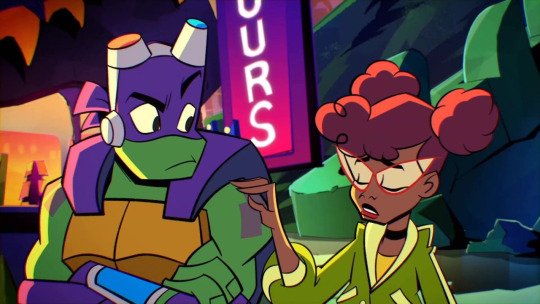
(Reader Included)
A/N: Any constructive criticism is appreciated. Reader comments and feedback are also welcomed a lot.
I have been gone for a long time. Just occupied with my studies! No fan fiction author curse or anything (yet).
Summary: You’re both adopting-parents of Casey. The story follows the perspective of Donatello and April O’Neil during the Kraang apocalypse. You and Leonardo decided to ask them to watch over thirteen-year-old Casey.
In other words, familial interactions between April, Donnie, and Casey Jr.
Reader: Gender-neutral pronouns are used, except the terms “(Mom / Dad)” are also used. Second POV.
Pairing: Rise! Future! Leonardo X Reader
Warnings: Bittersweet.
Word Count: ~3490
Parts: One / Two / Three / Four / Five / Six / ...
~
Donnie knew how much of a genius he was.
It was no surprise after all. In his late teens, he improved NASA’s satellites to communicate with planets light centuries away. He cured breast cancer through the use of protons in radiation therapy to target specific cells, rather than affecting the harmless. Hell, he even managed to discover a new type of radioactive particles: mutons. By that point, he—.
“—should have been given a Nobel Prize in Medicine and in Chemistry.” Donnie cursed under his breath. He strolled over to his lab bench, equipping his goggles.
Squeeeak.
April– who was found seated on Donnie’s roughed-up, spinning gaming chair– raised an eyebrow. Her hair had grown out and was left unbounded. Faint wrinkles and eye bags on her features displayed maturity, in contrast to a couple of years ago. However, everyone was well aware that time was not the only factor.
“Whatcha going on about now, Donnie?”
The softshell huffed. “Recall when I wrote a report about my experimental findings with an invention meant to revive a deceased human being?”
“...You mean the one where you thought it was a good idea to open up Curie’s tomb? Even gone as far as to ask for my help?” April grimaced. “Who’d ever forget that.”
She proceeded to massage her temples.
“God. You were in all kinds of messed up for that, Don.”
Lightning-like yellow sparks flickered as Donnie had his robotic hands occupied with a butane torch. His goggles were sealed tight around his eyes as he built a oval-looking device on his lab bench. Titanium outer-layer over a seriously complex circuit-board; appearing as if Samsung marketed grenades.
He scoffed. “Oh please. It wasn’t as if I’d taken long to understand how Marie Curie deserves her rest for her great contributions to radiation. Thus is why–.”
“–You decided to take a poor random husband of an old wife,” April interjected.
“Ahem.” Donnie pronounced. “The poor woman was begging me for her husband to be alive again. I was simply gracious and generous enough to not charge her for the process.” He set aside the butane torch. “At least it progressed well; he stayed alive for an additional two years. It gave his wife psychological comfort, and I was able to submit my paper to the N.S.F..”
He picked up a screwdriver. “Except....”
April could tell her friend’s eye was twitching.
“They rejected my findings, nearly had me detained, and claimed it was far too ‘unethical.’” Donnie raised his volume. “Scoff! As if those researchers weren’t committing the crime themselves! Taking bodies away from families and claiming them as scientific property without permission.
If I could go back in time and shove my documents in their jaws, you bet I would.”
April smirked. “Well, I have my regrets too, Donnie.”
“You sound rather amused, April. Is that so surprising? And here I never thought you would regret your part-time job at Albearto’s. Or the fact you wasted money to switch to journalism in university.”
WHACK!
April threw her bat at Donnie’s head, flying back to her hand like a boomerang.
“Watch your mouth, mister. I may have regretted Albearto’s, but not a single moment in my life did I ever regret my journalism passion.” She stood up.
“Ouch.” The softshell vocalized, squinting his eyes toward her. His robotic clampers paused, setting aside the torch and taking off his goggles.
“Mind yourself, April. Horse-playing is forbidden in the laboratory. I am not consenting to having yet another silver-titanium apparatus get scratched because of you.” Donnie gritted his teeth. “Can you hear the negative connotation?”
“Seriously, Donnie? Where’d that come from? Not only was that years ago but it ain’t anything except a simple accident.”
“‘Simple accident?’” the softshell repeated with dramatic offense. “An accident, like many others in science labs, which could have caused severe damage! Remember the incident when your teacher dumped bleach and vinegar into the trash bin?
You know, if you had paid any attention in your chemistry class, those two would make mustard gas?” Donnie side-eyed his friend. “Simple accidents can have serious consequences, O’Neil.”
A hand crept up the lab bench.
“Uh-huh, and I’m supposed to believe an instance of me knocking over your phone and books would kill somebody?” April crossed her arms. “If anything, the blame’s yours for not organizing your desk when you got drunk on coffee.”
The hand took ahold of the butane torch.
“Donatello? Disorganized? Sounds cheap coming from you, a student majoring in Journalism.”
April pulled up her coat’s sleeves. “Oh boy, you’re about to get it—.”
Squeeeak!
Heads spun and found a 13-year old boy, replacing April’s spot on Donnie’s chair. Casey eyed the torch with a great yet concerning amount of curiosity.
“Yo, what’s this for, Uncle Don?”
At lightning speed, while April ran to move the gaming chair away further from the workbench, Donnie snatched the tool from his hands. “Child. Casey. Young man.” The softshell heaved loudly. “I must inform you this is NOT meant to be handled with such casual ease. How in Hawking did you even—.”
“Don’t your lab have a passcode or something?”
“–Is what I am wondering myself, O’Neil. I refuse to believe this child remembers the beginning thirty numbers of π–.”
“Nope, only us.” April and Donnie lifted their gazes to his lab entrance. You leaned on the frame while a dear red-eared slider stood just behind. A couple of steps inside, and the metallic lab door shut close.
Donnie– strangely– was quick to hide his device-in-progress off to the side.
“You’re back!” April grinned. “Hell, you would not believe the convo Donnie and I were having a minute ago.” She hurried to hug you.
“Figures,” Leo remarked. “We could practically hear you yards off.”
“Sounds like things never get old.” You smiled.
There was a side-eye between Donnie and April, before the Commander proceeded to inquire, coughing: “Anyhow.. care to explain the occasion? You two don’t seem to be in a hurry.”
“The only times you ever visit my laboratory are to prepare for immediate combat engagement, and you look awfully collected.” The softshell furrowed his brows.
“No, no.” You waved your hands, shaking your head. “Thank God no. We came here to ask if you two could take care of our Casey here while we head out.” The other turtle scrunched his in-quote eyebrows. “You— You came here to request us to... babysit him?”
April jabbed him in his plastron.
“You see? Just like I said.” Leo turned to you. “I know my brother, love. Don’s not the kind of guy to take responsibility for a kid. Or anyone, really.”
“Hold on.” Donnie narrowed his eyes. “I never said I refused, Leo.”
“Don’t know, it sounds like it to me.”
“Well, my misinformed brother, contrary to your belief, I am perfectly capable of handling a child.”
You huffed with amusement. Your husband only winked back.
“If you say so, Don.”
“Where are you two heading off for if you needed us to watch over him?” April inquired. “Wondering, ‘cause this never happened even when you two leave for patrol.”
“Just finding some time for ourselves.”
April exclaimed, “As in a honeymoon? Why not just say so? We’ll leave you two alone–.”
“–In this economy and climate?” Donnie interjected. “Has it also not been six years since your yet-to-be-legal marriage?”
“Alright, alright,” Leonardo chuckled. “Cut us some slack, bro. Finding time wasn’t easy when there’s Kraang above our necks.”
“Right, and you’re going on a honeymoon, how?” The softshell crossed his arms. “Simply because you’re the leader does not equate to you making wise decisions, Leo.”
“His ōdachi can teleport anyone to anyplace, we have some hope we can easily teleport to a remote area,” you answered. “One without Kraang infestation. It’ll be hard, but we may as well try.”
“Bonus points if we find clear skies and an ocean.” The red-eared turtle grinned, wrapping his arm over your shoulders.
“What’s a honeymoon, (Mom / Dad)?”
Your hand went to caress Casey’s cheek. “Parent quality time. It just means you get to handle yourself like the responsible grown-up you’ll become one day. Just promise me you’ll be on your best behavior around Uncle Don and Auntie April?”
“I promise, (Mom / Dad)!”
“Good boy,” Leo laughed, ruffling the kid’s hair.
“You didn’t ask Mikey and Raph to help out too, or?”
“Between you and me, I think you guys are better of making sure Casey doesn’t get into any chaos,” you whispered to April. “Don’t tell them that, though.”
She laughed. “Okay, I see how it is. You both have fun.”
Donnie bit his lip. Right as Leonardo and (Name) turn to exit the laboratory, he extended his arm out to them.
“Leo, (Name).”
You two faced back to him once more.
“Don’t kill yourselves out there.”
Everyone’s eyes widened– April, you, and Leonardo himself. But the brother in blue snickered, holding a smile that reached his eyes. “So you do also care for me, Don. And all this time I thought you were plotting to put me in my grave or something.”
“We won’t.” Leo placed a hand on your shoulder. “You got my word.”
“Bye (Mom / Dad)! Bye Papa!”
“We’ll be back soon, Casey!”
Donnie stood in silence as you finally left, leaving himself with none other than his best friend and his nephew. “I refuse to believe this is the future we have to deal with.”
“Times changed all of us, didn’t they?” April spoke. “One day we wish each other a good one, and the next, we hope we just don’t die. I could’ve been a famous news anchor by now, make my mother happy, fight crime without worrying about dying the next second.
..I wonder if there’s anyone else out there besides the small number of us down here.”
“..I doubt it.”
Donnie pulled himself together and walked back to his workbench, operating his clampers to work once again. He put on his goggles. Casey, being a young teenager of enthusiasm, peeked over.
“Watch yourself, boy,” April warned.
“Don’t worry about me, Auntie. I’m only standing over here.” Casey narrowed his eyes upon the glowing and metal-like ball his uncle had his tools on. “What are you working on, Uncle Don?”
“A sphere.”
“A sphere?”
“You heard correctly.”
“That sounds kind of boring.”
Donnie had to hold himself back from remarking with: ‘That is exactly what every child whose intellect is doomed would say.’
“I’m sure your mother would find it rather moving.”
“(Mom / Dad)? I don’t understand what’s emotional about a ball, though.”
“Hey Casey.” April coughed. “Why not tell us about your mask here? Haven’t taken a good look at it before. Maybe Uncle Don would like to hear it too.”
“You actually want me to talk about my mask?”
“Ain’t a problem, is it?”
“No.” He fidgeted with his fingers a bit. “You don’t have anything else to do?”
“We were just told to watch over you, kid.”
“Yeah, but everyone I know is always busy with the Kraang or supplying weapons. I never really get chances to hang out.”
There was a brief pause in the butane torch’s flame.
April’s expression softened. Her hand came up to brush his black hair. “Things have gotten calmer up there. So you’ve got plenty of time with us now.”
Casey smiled.
“So your mask?”
The boy alternated between covering his face and removing it. “(Mom / Dad) gave it to me. She told me it is based on the one worn by my biological mother. (Mom / Dad) also said that my birth mother was kind of crazy-funny and likes to be loud. She would have a stick to play– what was it– hockey?
I don’t know what kind of game hockey is supposed to be, but I guess it’s nice to know how life was like before all the Kraang.”
A sad smile crept on April’s lips.
“Anyways, I thought the mask looked kind of plain, so I decided to draw red marks on it. See?” Casey showed his mask off, fingers tapping the surface. “Guess who it looks like!”
There were two bold and thick streaks of red. Each one ran through one eye, truly a defining characteristic. The Commander chuckled, already imagining how much pride her friend in blue would feel from the fact a kid– let alone one he had been parenting– looked up to him so much.
“You know, I am seeing someone familiar here.” April hummed as she put on a thoughtful facade. Fingers holding her chin and everything. “Got to be Uncle Don.”
Named turtle paused for a moment and raised a brow.
“Seriously, Auntie April?” On the other hand, Casey gave her an incredulous look and shook his head. “You probably want to get your eyes checked out, ‘cause Uncle Don doesn’t have any red stripes.” Off to the side. “And even if he did, he won’t look as cool as Dad.”
April snickered behind her palm as Donnie eyed the boy from behind his goggles.
“You’re right, you’re right. Just messing with you, kid.” Her hand ruffled his hair once more. “Sounds like you really admire your Papa, don’t you?”
“Why wouldn’t I? Dad has an awesome sword that opens up portals. He always moves so quickly whenever he’s fighting. Bam! And the Kraang’s gone!” The teenager stretched his arm for emphasis. “Even as the leader, Papa knows when to get serious and when to make people laugh. He also cares a lot about me, (Mom / Dad), you guys, and everyone!”
It made even Donnie himself smile.
However, the way Casey’s enthusiasm died down had not gone unnoticed. “I’ve always wanted to help out though.” He sighed, shoulders slumping. “I want to fight the Kraang right by his and (Mom / Dad)’s side. Except I barely get the chance to, because they keep telling me to stay close to base and hide behind a giant rock.”
April crossed her arms and went quiet. His feelings were nothing new. In fact, she experienced the same thing herself, seeing she had always been a human. It was like that until–.
“Have no hard feelings,” Donnie spoke up, his hands and eyes remained on his spheric gadget. The sparks were flying. “Your parents are merely worried about your well-being.”
“I know, I know. They won’t have to though, if I can have enough training or something.” Casey sighed. “Then again, I also know I’m only a normal sensitive human.
...Why can’t I be a mutant instead?”
“Ahem. You are classified as a human. That is a true statement and one you cannot change.” Donnie hummed. “However, that does not mean you cannot be strong and capable in other ways.”
“Why does it sound like you’ve been in my place before?”
“Perhaps I did. Did you truly think being a soft-shell turtle is easy? I happened to be born as one of the only Testudines species whose outer shell cannot protect.” Donnie remarked. “Casey, your mask.” His hand signaled.
“What about my mask?”
“I merely want to add something.”
Confused, he hopped off the chair and handed the mask over. “Hmm. As long as you don’t mess with the stripes, Uncle Don.”
“Who says I won’t?”
Casey kicked Donnie’s leg.
“‘Ow,’ I say sarcastically without feeling physical pain.”
“Hmph.” He crossed his arms. “Why do you keep saying things like that?”
“Such as?”
“You say those action verbs, even when you’re already doing them.”
April snorted. “Just his thing, kid. Uncle Don’s got his special quirks.”
“Do you have a quirk?”
“Picking unnecessary fights for one,” Donnie commented.
“You only call them ‘unnecessary,’ because you never want to fix the problem.”
He rolled his eyes. “My solution would’ve been ten times more efficient if you had allowed my technology and I to do the work.”
Casey wondered. “Does your tech ever go haywire, Uncle Don?”
“No.”
“Oh man,” April began, “you should’ve been there for this one time. Your Uncle Don was building some kind of overprotective bed to keep your late Gramps from waking up from his beauty sleep.”
“Gramps likes to sleep?”
“You’d be surprised to hear that he sure does.”
“Then what happened?”
“Uncle Don asked your Dad, Uncle Mikey, and Uncle Raph to try punching, slicing, throwing whatever they could on the bed. They were attacking it like crazy!”
“And then?”
“And the bed was even more insane, ‘cause there were actual missiles shooting out! They went straight for his brothers. At some point, it got overboard, so Uncle Don tried to command it to stop.”
“I’m hearing a ‘but’ coming.”
“But it malfunctioned and thought Uncle Don was the enemy!”
“However!” Donnie pointed his finger up, interrupting the story-telling. “It did not take long for my creation to recognize his master.”
“Still went haywire in my book,” April remarked.
“Ignoring that.” His robotic hand tapped the edge of his workbench, grabbing Casey’s attention. “Come here, young man.” He slid back the mask, except in his hands, it felt as if the frame had thicken.
“It looks the same, but it doesn’t feel the same?”
“Try wearing it over your face.”
The boy did as told. All of a sudden, a bunch of green rectangles and words appeared in his vision. He gasped in awe. He spun around slowly, watching the rectangle focus on a figure through the wall.
“Yes yes, I know. I am well aware of how amazing I am.” Donnie huffed in pride. “I have opted to construct an interface with your mask. I cannot see why you shouldn’t have something to defend yourself with,” he reasoned. “I have other updates in mind later on. As of now, however, your mask will help you detect life forms across other rooms or through other objects.”
“That’s so cool!” The boy hesitated though. “But I don’t want to break it or anything.”
“Hey.” April rested her hand on Casey’s shoulder, giving a firm squeeze. “Our resources are already scarce. Using then losing them is better than nothing. You better make the most of our tech. Understood, soldier?”
Casey grinned underneath his mask. He fixed his posture up and saluted. “Gotcha–! Understood, Commander!”
He faced the inventor, whose hands were already back to being occupied with the “sphere.” “Thanks so much, Uncle Don!” Casey exclaimed, leaping towards the turtle to give a tight hug. “You’re the best!”
Upon contact, Donnie stiffened up, but his lack of experience with physical touch did not prevent a smile forming on his face. He extended a robotic arm, patting Casey’s back.
The boy then scanned around curiously with his mask. “Hey! Think I spot Uncle Mikey and Uncle Raph two floors down! They’re holding hands over a table or something. Why are so many people circling around them?”
April rolled her eyes. “Sounds like another arm-wrestling match between the our youngest and oldest brother.”
Just like that, Casey booked it out of the laboratory so quickly, it reminded her of a certain red-eared slider. “What the–! Casey!” April groaned. “And here I thought we don’t have to deal with runaway kids. I better catch up to him.”
“Would not worry about him too much,” Donnie commented.
“What do you mean by that?”
“Considering we will not always be alive to protect him... the sooner we leave him to himself, the easier it will be for him to survive alone.”
“Hey. Come on now.” April walked to her best friend’s side. “Don’t you say things like that. We’re all going to survive this together–.”
“April.” Slight pain wavered in his voice. “You know as well as I do how our current reality is. It is only a matter of time before the Kraang finds everyone.”
“Yet you’re still here trying.”
No response.
“It’s all because of the kid, isn’t it?” April affirmed. “He ain’t any genius prodigy you were expecting long ago. But he gave you a reason to try– he became someone worth fighting for.”
“I would not put it as simply as that.”
She shrugged. “That’s how I’d say it. You know you’re not the only one whose life changed because of Casey.”
Donnie paused his work, turning off the butane torch and finally pulling his goggles off his eyes again. “...Casey reminds me of when we were young, being rash and immature teenagers like any other. I hate admitting to such thing, but I was one too. And I hate admitting much more how much I missed those times.
The child has known nothing of the trouble we’ve experienced outside, April: when Cassandra was killed, when Draxum was torn apart, when Dad decided to sacrifice himself despite the slim odds.” His hands clenched into fists.
“Do not expect me to have any false hope for our future, but do not assume I would want Casey to feel the same way. For as long as he can, I want him to hold onto that false hope.”
“...” April had her arms crossed. Her eyes slowly came to linger on the workbench. “Is that ‘sphere’ his false hope?”
“..No. Not his.” Donnie traced his thumb over his contraption. “It’s for (Name).”
#rottmnt donnie#rise donnie#rottmnt leo#rottmnt april#rise april#rottmnt casey jones#rottmnt casey jr#rottmnt#rise of the tmnt#rise of the teenage mutant ninja turtles#rottmnt movie#rottmnt leo x reader#reader insert#tmnt#rottmnt x reader
77 notes
·
View notes
Text
Over the holiday weekend, all but one member of the editorial board of Elsevier’s Journal of Human Evolution (JHE) resigned “with heartfelt sadness and great regret,” according to Retraction Watch, which helpfully provided an online PDF of the editors’ full statement. It’s the 20th mass resignation from a science journal since 2023 over various points of contention, per Retraction Watch, many in response to controversial changes in the business models used by the scientific publishing industry.
“This has been an exceptionally painful decision for each of us,” the board members wrote in their statement. “The editors who have stewarded the journal over the past 38 years have invested immense time and energy in making JHE the leading journal in paleoanthropological research and have remained loyal and committed to the journal and our authors long after their terms ended. The [associate editors] have been equally loyal and committed. We all care deeply about the journal, our discipline, and our academic community; however, we find we can no longer work with Elsevier in good conscience.”
The editorial board cited several changes made over the last ten years that it believes are counter to the journal’s longstanding editorial principles. These included eliminating support for a copy editor and a special issues editor, leaving it to the editorial board to handle those duties. When the board expressed the need for a copy editor, Elsevier’s response, they said, was “to maintain that the editors should not be paying attention to language, grammar, readability, consistency, or accuracy of proper nomenclature or formatting.”
There is also a major restructuring of the editorial board underway that aims to reduce the number of associate editors by more than half, which “will result in fewer AEs handling far more papers, and on topics well outside their areas of expertise.”
Furthermore, there are plans to create a third-tier editorial board that functions largely in a figurehead capacity, after Elsevier “unilaterally took full control” of the board’s structure in 2023 by requiring all associate editors to renew their contracts annually—which the board believes undermines its editorial independence and integrity.
Worst Practices
In-house production has been reduced or outsourced, and in 2023 Elsevier began using AI during production without informing the board, resulting in many style and formatting errors as well as reversing versions of papers that had already been accepted and formatted by the editors. “This was highly embarrassing for the journal and resolution took six months and was achieved only through the persistent efforts of the editors,” the editors wrote. “AI processing continues to be used and regularly reformats submitted manuscripts to change meaning and formatting and require extensive author and editor oversight during proof stage.”
In addition, the author page charges for JHE are significantly higher than even Elsevier’s other for-profit journals, as well as broad-based open access journals like Scientific Reports. Not many of the journal's authors can afford those fees, “which runs counter to the journal’s (and Elsevier’s) pledge of equality and inclusivity,” the editors wrote.
The breaking point seems to have come in November, when Elsevier informed coeditors Mark Grabowski (Liverpool John Moores University) and Andrea Taylor (Touro University California College of Osteopathic Medicine) that it was ending the dual-editor model that has been in place since 1986. When Grabowki and Taylor protested, they were told the model could only remain if they took a 50 percent cut in their compensation.
Elsevier has long had its share of vocal critics (including Ars Technica’s Chris Lee), and this latest development has added fuel to the fire. “Elsevier has, as usual, mismanaged the journal and done everything they could to maximize profit at the expense of quality,” biologist PZ Myers of the University of Minnesota Morris wrote on his blog Pharyngula. “In particular, they decided that human editors were too expensive, so they’re trying to do the job with AI. They also proposed cutting the pay for the editor-in-chief in half. Keep in mind that Elsevier charges authors a $3,990 processing fee for each submission. I guess they needed to improve the economics of their piratical mode of operation a little more.”
Elsevier has not yet responded to Ars’ request for comment.
Not All AI Uses Are Created Equal
John Hawks, an anthropologist at the University of Wisconsin–Madison, who has published 17 papers in JHE over his career, expressed his full support for the board members’ decision on his blog, along with shock at the (footnoted) revelation that Elsevier had introduced AI to its editorial process in 2023. “I’ve published four articles in the journal during the last two years, including one in press now, and if there was any notice to my coauthors or me about an AI production process, I don’t remember it,” he wrote, noting that the move violates the journal’s own AI policies. “Authors should be informed at the time of submission how AI will be used in their work. I would have submitted elsewhere if I was aware that AI would potentially be altering the meaning of the articles.”
There is certainly cause for concern when it comes to using AI in the pursuit of science. For instance, earlier this year, we witnessed the viral sensation of several egregiously bad AI-generated figures published in a peer-reviewed article in Frontiers, a reputable scientific journal. Scientists on social media expressed equal parts shock and ridicule at the images, one of which featured a rat with grotesquely large and bizarre genitals. The paper has since been retracted, but the incident reinforces a growing concern that AI will make published scientific research less trustworthy, even as it increases productivity.
That said, there are also some useful applications of AI in the scientific endeavor. For instance, in January 2024, the research publisher Science announced that all of its journals would begin using commercial software that automates the process of detecting improperly manipulated images. Perhaps that would have caught the rat genitalia figure, although as Ars science editor John Timmer pointed out at the time, the software has limitations. “While it will catch some of the most egregious cases of image manipulation, enterprising fraudsters can easily avoid being caught if they know how the software operates,” he wrote.
Hawks acknowledged on his blog that the use of AI by scientists and scientific journals is likely inevitable, and he recognizes the potential benefits. “I don’t think this is a dystopian future. But not all uses of machine learning are equal,” he wrote:
It’s bad for anyone to use AI to reduce or replace the scientific input and oversight of people in research—whether that input comes from researchers, editors, reviewers, or readers. It’s stupid for a company to use AI to divert experts’ effort into redundant rounds of proofreading, or to make disseminating scientific work more difficult. In this case, Elsevier may have been aiming for good but instead hit the exacta of bad and stupid. It’s especially galling that they demand transparency from authors but do not provide transparency about their own processes … It would be a very good idea for authors of recent articles to make sure that they have posted a preprint somewhere, so that their original pre-AI version will be available for readers. As the editors lose access, corrections to published articles may become difficult or impossible.
The journal Nature published an article in March raising questions about the efficacy of mass resignations as an emerging form of protest after all the editors of the Wiley-published linguistics journal Syntax resigned in February. (Several of their concerns mirror those of the JHE editorial board.) Such moves certainly garner attention, but even former Syntax editor Klaus Abels of University College London told Nature that the objective of such mass resignations should be on moving beyond mere protest, focusing instead on establishing new independent nonprofit journals for the academic community that are open access and have high academic standards.
Abels and his former Syntax colleagues are in the process of doing just that, following the example of the former editors of Critical Public Health and another Elsevier journal, NeuroImage, last year.
13 notes
·
View notes
Text
If I could inject Skyfire into the animated verse I'd make it so he and Starscream still have their shared history but it's a tad different.
Starscream starting off as some form of scientist, or researcher. A role he finds boring and is frustrated by what he perceives as a lack of respect. And Skyfire having been created/designed as a military machine (much like Omega Supreme in animated) and like Starscream he's dissatisfied with the role and dreams of being allowed to explore the stars and pursue knowledge.
This mutual dissatisfaction was the foundation of their friendship as they both felt forced into a life they didn't want and weren't "destined" for and ultimately resulted in them siding with the decepticons in order to get the lives they wanted.
Unfortunately they also shared a mutual jealousy. Skyfire being jealous that starscream had access to a wide range of knowledge, a privilege he didn't seem to appreciate. And of course Starscream was jealous of Skyfires power and the fear he could inspire in others (something Skyfires self conscious about) as well as what he perceived a skyfire wasting his potential. This would lead to a lot of built up tension between them as Skyfire would start to feel Starscream didn't take full advantage of the opportunities and choices he was given, things Skyfire would have killed to have. And of course Starscream began to perceive Skyfire as looking down on him.
Of course this friendship would eventually fall out somehow which I think would coincide with Skyfire leaving the Decepticons as he came to object to their methods and realizing that Megatron had no intention of actually giving him what he had likely been promised. That being a cybertron that would let him freely explore the universe and pursue his true passion of scientific research and development.
Now, an important aspect I'm not sure of is WHEN Skyfire betrays the decepticons and/or defects. As it would slightly alter the reasoning for why he doesnt seem to be around in series. Not by a lot but still.
Regardless of whether Skyfire openly defects, acts as a spy, leaks autobots into, etc. he winds up playing a role in winning the war and driving the decepticons from Cybertron.
Although he ultimately helped them win, I think tfa Skyfire would not stick with the autobots. Either because he winds up exiled like the rest of the decepticons (something I imaging happening if he didn't defect until the end of the war) or else he allowed himself to go into self-exile after having lost faith in Cybertron as a whole.
After all, he'd banked on the decepticons being a way to change cybertron into a more equal and free society, but they'd just turned out to be warmongering despots. And while the autobots likely do change a bit after the war, its not enough for Skyfire to gain any confidence in the government. Besides all that a requirement for his full amnesty could have been a required frame change, something skyfire rebelled against. Not because he loved having a war frame but because he viewed it as just another way the autobot government was exerting their power over his body and mind.
So Skyfire is either forced into exile or willing goes into it in order to preserve his own ideals. I imagine him finding old reports and journals and slowly teaching himself all the scientific knowledge and know how that he'd always wanted to learn and partaking in scientific experiments and explorations. All of which hes VERY satisfied to find that hes good at.
He tells himself that hes happy this way, but in reality he is crushingly lonely. He creates an assitant bot named Doc (stealing that from idw lol) and may even start keeping some organic lifeforms he finds around his lab as "pets" in order to have some form of company. Beyond the crushing loneliness though, hes also frustrated to find that despite pursuing the self education he'd always wanted hes dissatisfied as he has no one to share these discoveries with.
How exactly he comes into contact with our main cast I'm not sure. Maybe they crash land on the planet or asteroid or moon or whatever his lab is on, maybe the decepticons/autobots are both coming after him, etc.
Regardless of the exact circumstances, I really like to imagine that he develops a sorta odd friendship with Isaac Sumdac, who is someone of similar interests he can finally share his own knowledge and ideas with. Furthermore he'd probably have some VERY interesting interactions with the Jettwins (he isn't a huge fan of what was done to them, even if they seemingly enjoy the results, as it shows yet again how ready the government of cybertron is to control the forms of regular cybertronians to meet their own ends) and especially Omega Supreme who, much like Skyfire, was more or less created to be used in a war.
#tfa#transformers animated#transformers#I just keep imagining an additional season for animated#featuring characters like skyfire and drift#and an exploration of how megs got the support to start the war in the first place#and all the things that still need to be fixed in cybertronian society.#maccadam#skyfire#tfa skyfire#tf skyfire#tf jetfire
34 notes
·
View notes
Text
Criminal Minds ABCs...
Hi all! I hope you are having a good week so far. I made a Criminal Minds ABCs for fun. All of the ABCs deal with characters or concepts from the show. This took a long time to make and I'm very proud of it, so I hope you enjoy it! See all of the ABCs under the cut and all photo credits are at the end! Please be kind to yourself today and I am sending you a hug. All likes, comments, and reblogs are appreciated - Love Levi <3

A stand for Aaron Hotchner: Unit chief of the BAU.
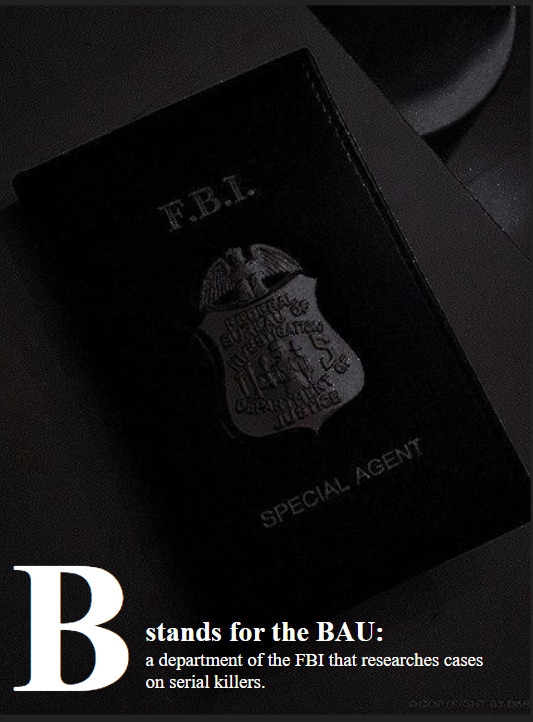
B is for the BAU a department of the FBI the researches cases on serial killers.

C is for Criminology: The scientific study of crimes and criminals.
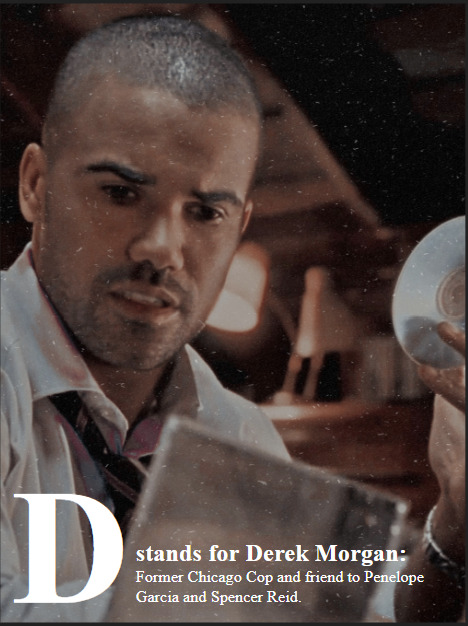
D is for Derek Morgan: Former Chigaco cop and friend to Penelope Garcia and Spencer Reid.
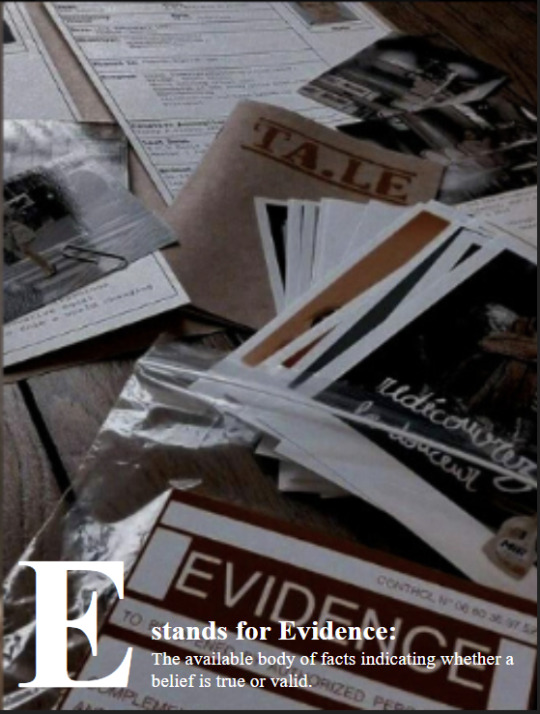
E is for Evidence: The available body of facts indicating whether a belief is true or valid.
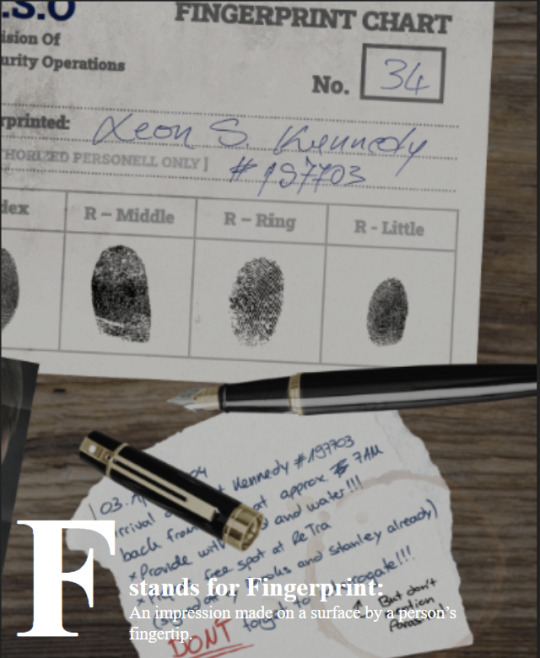
F is for Fingerprint: An impression made on a surface by a person's fingertip.
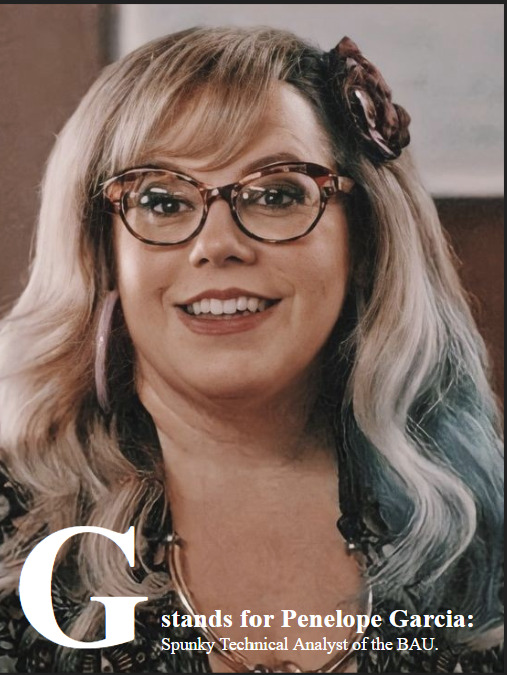
G if for Penelope Garcia: Spunky Technical Analyst of the BAU.

H is for Homicide: The killing of one person by another.
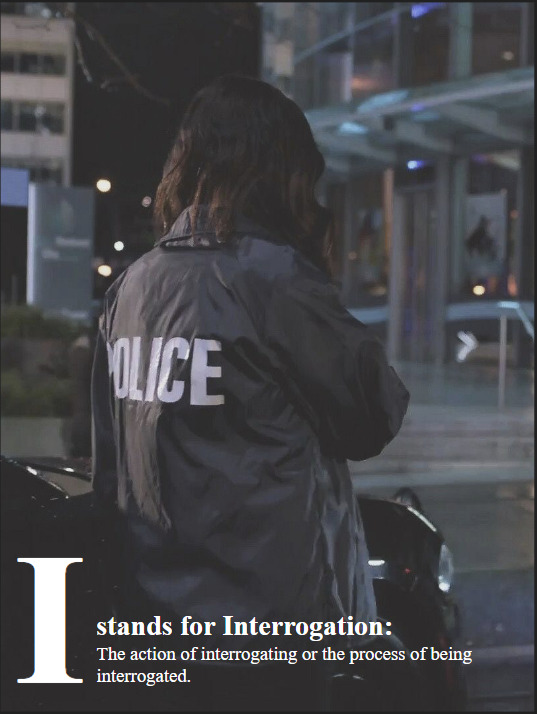
I is for Interrogation: The action of interrogation or the process of being interrogated.
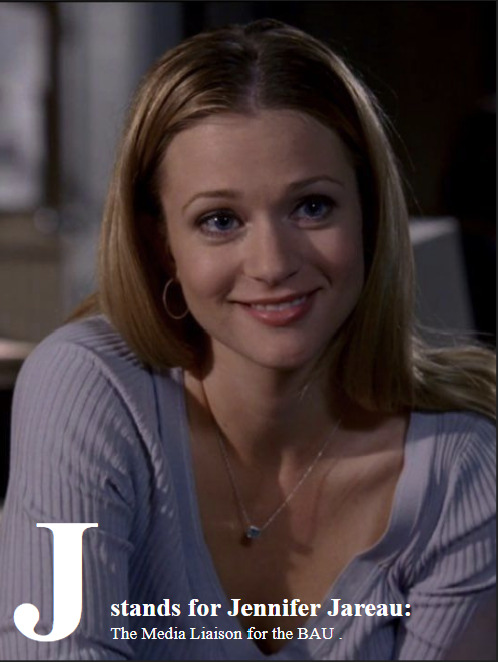
J is for Jennifer Jareau: The Media Liason for the BAU.

K is for Kill shot: To shoot a gun with the purpose of killing someone.

L is for LDSK: The FBI's acronym for Long Distance Serial Killer.
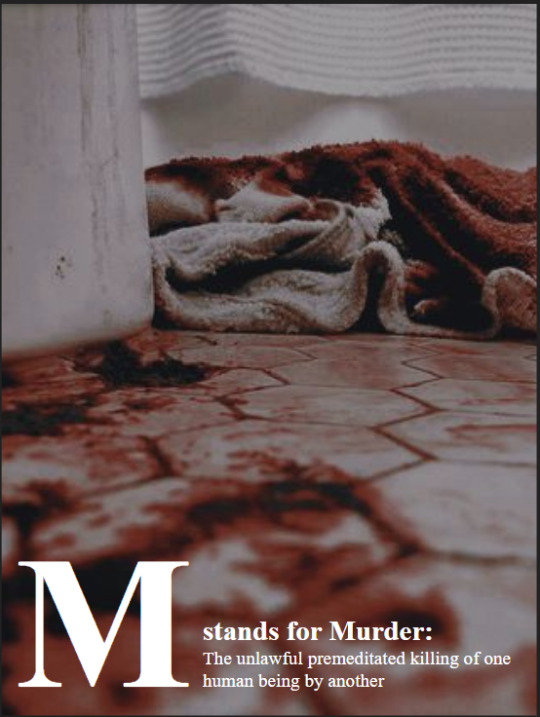
M stands for Murder: The unlawful premeditated killing of one human being by another.

N stands for New Agent Training: The Basic Field Training Course is designed to train new special agents and intelligence analysts together to prepare them for the field.
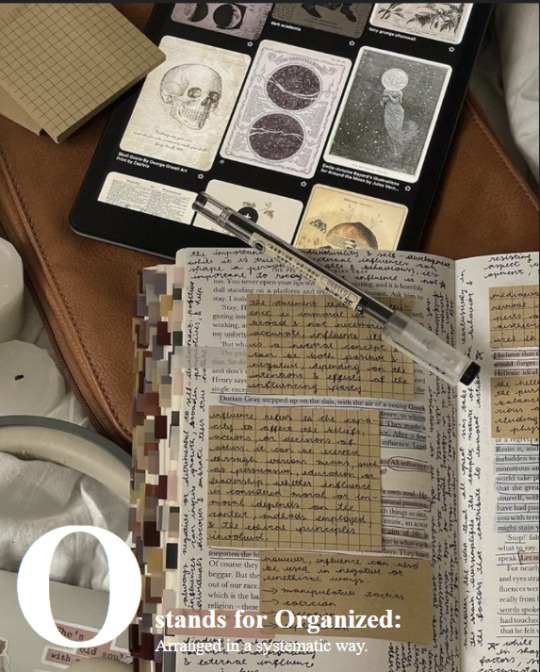
O stands for Organized: Arranged in a systematic way.
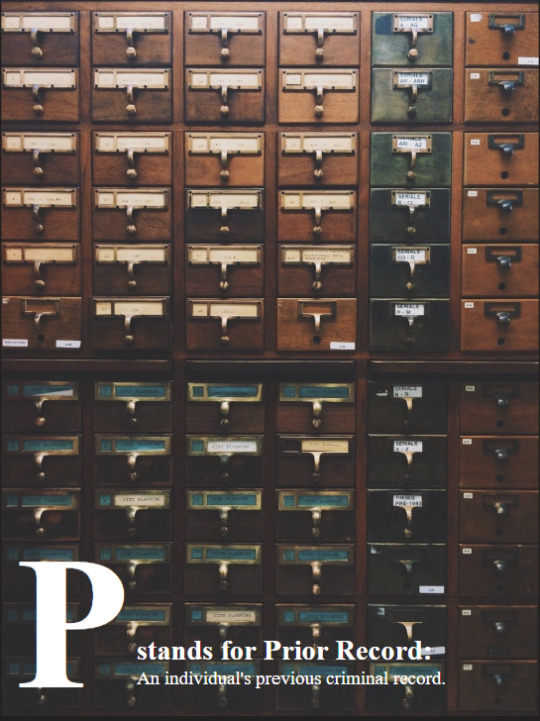
P Stands for Prior Record: An individual's previous criminal record.
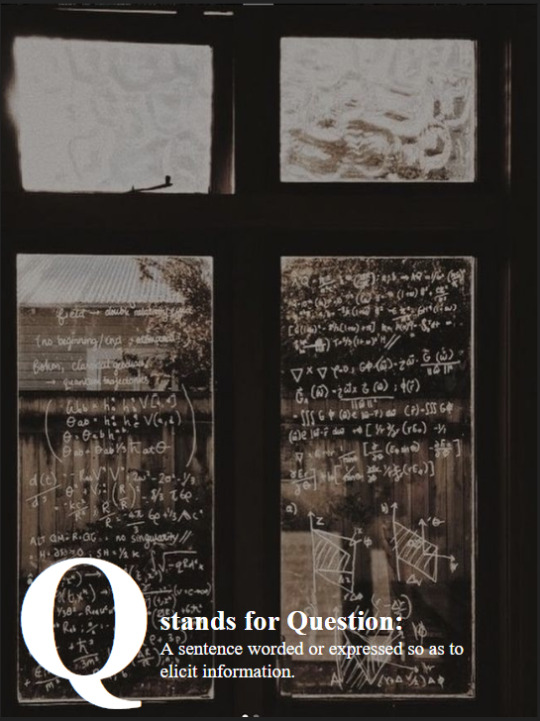
Q stands for Question: A sentence worded or expressed so as to elicit information.
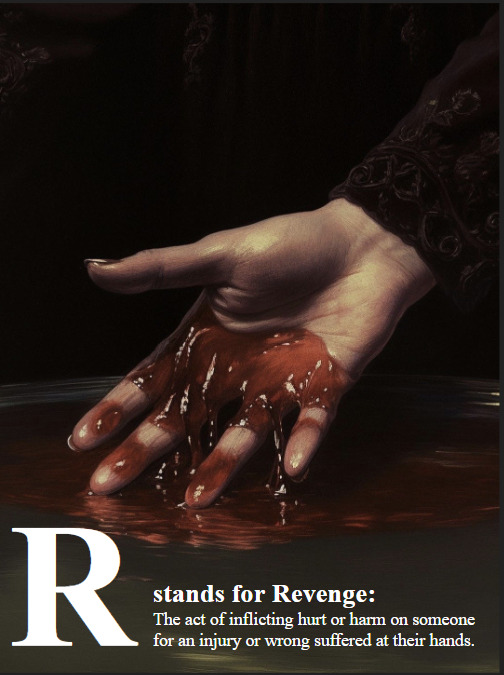
R stands for Revenge: The act of inflicting hurt or harm on someone for an unjury or wrong suffered at their hands.

S stands for Spencer Reid: Eidetic genius and youngest member of the BAU.
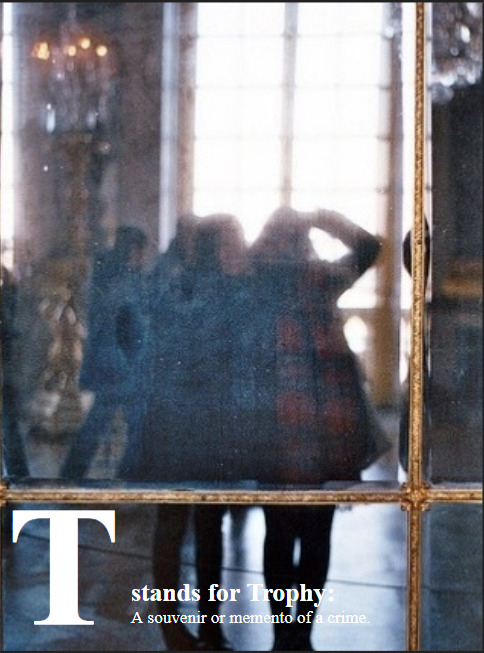
T stands for Trophy: A souvenir or memento of a crime.

U stands for Unsub: The FBI's slang for Unknown Subject.
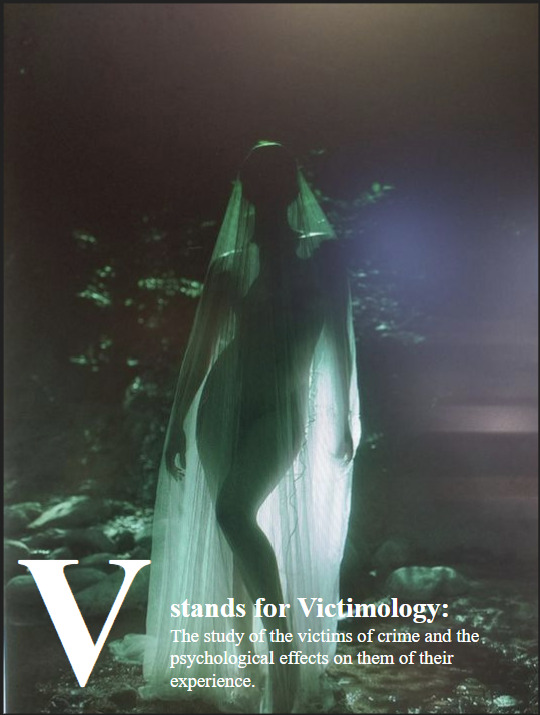
V stands for Victimology: The study of the victims of crime and the psychological effects on them of their experience.
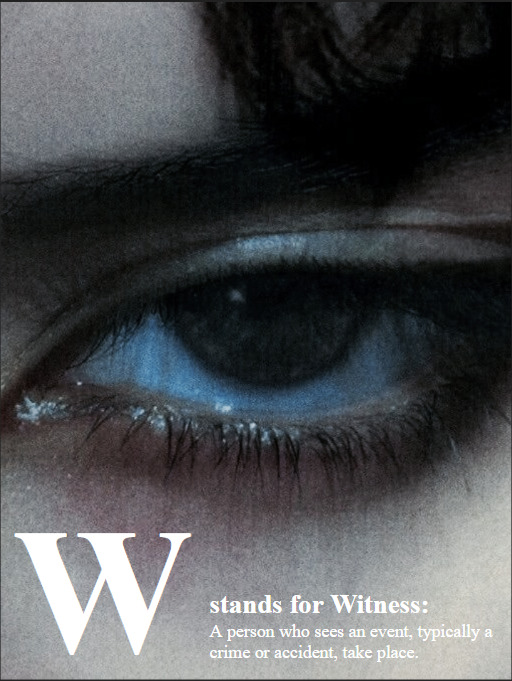
W stands for Witness: A person who sees an event, typically a crime or accident, take place.
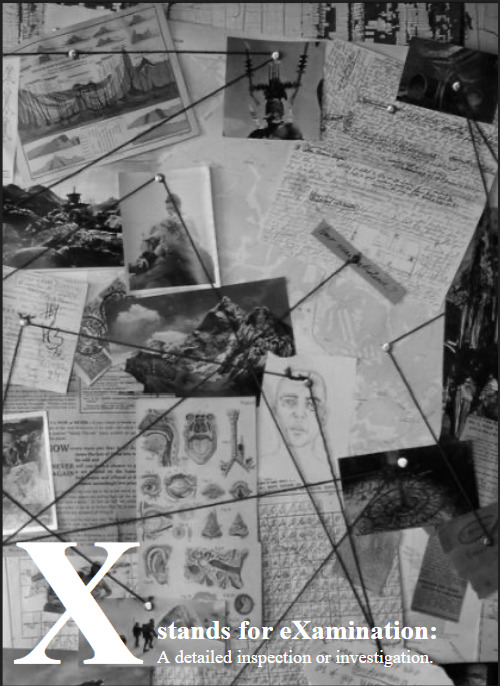
X stands for eXamination: A detailed inspection or investiation.
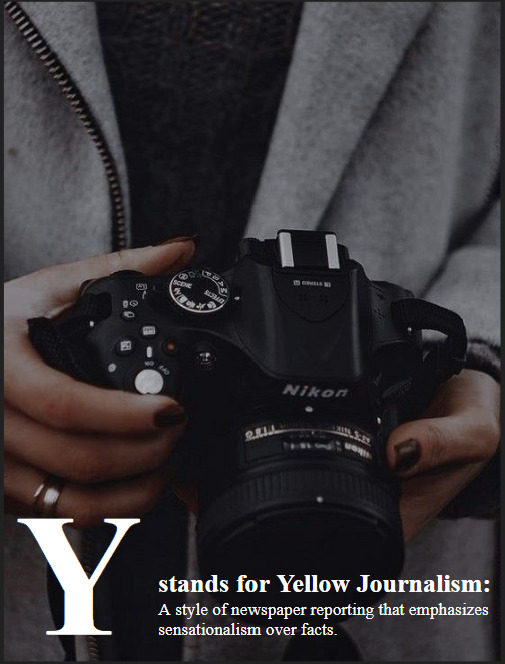
Y stands for Yellow Journalism: A style of newspaper reporting that emphasizes sensationalism over facts.

Z stands for ZZZ's on the jet home

Text Break Banner by @cafekitsune
Tag list: @geminitapestry @silk-spun @alicewonderao3 @ssahotchnerr @cumulo-stratus @criminalskies
Want to be added to my tag list? Please check out this post (linked)
Want to send in a request? Please check out this post, CM Request Post (linked)
Photo Credits:
A @hotchs-big-hands B @bau-bitch02 C @elysianmuses D @pennyspearl E @sewertrashmax F @dienette-666 G @pinkiebieberpie H @baekkku I @magicbecameouragenda J @tokyocyborg K @animefan-2013 L @its-where-the-wild-things-are M @roting N @moodboardmix O @study-sphere P @finalchokehold Q @aurorasoleil R @bebs-art-gallery S @tokyocyborg T @wheresmyfuckintea U @lieutenant-bixbyV @thesorceresstemple W @shegetsburned X @cloverdaisies Y @dumblr Z @notoneofyouhere
#cm#jj criminal minds#cm abcs#criminal minds abcs#cm mood board#criminal minds moodboard#effort post#cm effort post#abcs#aaron hotcher#ssa aaron hotchner#penelope garcia#jennifer jareau#derek morgan#spencer ried#dr spencer reid#unsub#ldsk#murder#revenge#bau aesthetic#fbi aesthetic#criminal minds#mood board#i love cm#aesthetic#crime aesthetic#justice aesthetic#dark aesthetic#dark academia
29 notes
·
View notes
Text
Professor Belle

Belle: Félix, can I go with you to the excavation site tomorrow?
Félix: Of course, but I'll need you to stay with me the whole time. I have a new group of students, and they'll need to focus. I don't want them thinking they have to babysit you.
Belle: No one has to babysit me. I'm a member of the research team. Right?
Félix: Yes, but the students might be skeptical of that. Not every person your age is as responsible and intelligent as you, and unfortunately, some people have a tendency to prejudge.
Belle: Well, that’s just dumb.
Davian: *laughing* It's good to know the youngest member of the research team can still act like a ten year old.
Belle: I'm responsible and intelligent, but nobody said I was a grownup.
Davian: Fair point.
Félix: But you are mature, and we can trust you. That's why you're allowed to come to the excavation site.
Belle: Yeah. Can you imagine my friends at the site? Junior would probably break stuff, and you'd always have to be getting Caroline down from a tree or something. I know I should only climb trees around the field station.
Davian: We'd be happier if you didn't climb trees anywhere, but you know the risks, so...
Belle: Evaluate my choices, right?
Davian: Right.
Belle: I'll be too busy to climb trees tomorrow anyway. I have discoveries to make and students to teach.
Félix: Oh? Are you taking over for me, Professor Belle?
Davian: She probably can teach them something, you know. She's already got more archaeological experience than they do.
Félix: I'll tell you what, Belle. Why don't I let you have a few minutes to instruct the students tomorrow? You can be my assistant. We'll practice this evening so you'll know what you want to say when the time comes.
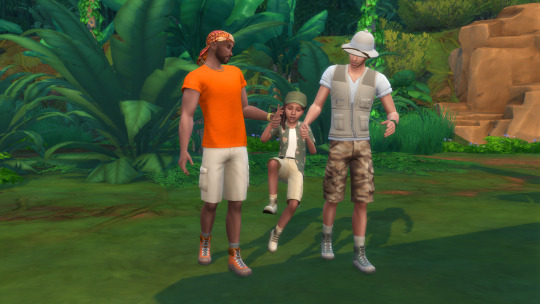
Belle: Yay! I'm going to be the best assistant you've ever had, I promise!
Félix: I have no doubt.
Belle: So, if I'm going to the site tomorrow and I'm going to be busy all day, does that mean I can skip my math lesson?
Davian: No. It means you'll have to do extra lessons the day after. Just because you're in the rainforest and you're learning cool stuff that isn't in your school books, that doesn't mean you get to ignore them. Remember, there's still going to be a test.
Belle: So, I guess the right choice would be to get ready for the test. I just wish I liked math more.
Félix: It's okay if you don't like it. Nobody can force you to like things. I'm not friends with math either, and when I was your age I was much happier following my father all around Al-Simhara and making discoveries with him. But I had to study math as well, because I needed it to graduate high school and get into university.
Belle: I'm going to university some day. I guess that means I have to be nice to math, even if we're not friends.
Félix: Be nice to math and it'll be nice to you.
Belle: *giggling* By helping me get into university?
Félix: Exactly so.
Belle: I can live with that.
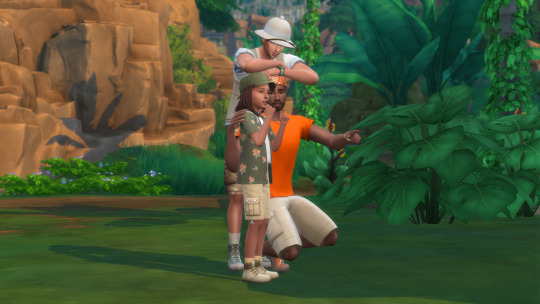
Davian: Now that we've got that settled, how about we do a little exploring before dinner? I'll bet we can find some awesome butterflies if we take that trail over there. Check out all the flowers. I hear tropical butterflies love those.
Belle: Yes! Félix, can Davian and I borrow your camera? I want to take pictures if we see any butterflies. Then I can identify them and write a paragraph for my science journal.
Félix: That sounds like a good idea. While you and Davian are out butterfly hunting, I'm going to catch up with Dr. Santiago. I'll see the two of you at dinner at the field station.
Davian: Sounds good.
Belle: If we find any butterflies, we'll tell you all about it!
Félix: I can hardly wait. Good luck.
Belle: I think it's more about scientific methodology than luck.
Félix: *smiling* In that case... good scientific methodology, Professor Belle. I await your report on your findings.
27 notes
·
View notes
Text
Little Emma Beyer’s Very Curious Eyes Attracted Medical Researchers And Kidnapers
On the day Emma Beyer was born in 1882, her family suspected something was seriously wrong with her eyes. Emma’s father told the Cincinnati Enquirer [8 August 1897]:
“When Emma was born, we thought for a time that she would be blind, as a film appeared over both eyes. After a few weeks this film gradually disappeared until she was able to see a little, and by degrees it was entirely removed.”
Once her eyes were fully visible, the family discovered that little Emma was a most amazing freak of nature. According to the Enquirer [29 April 1888]:
“She possesses eyes of such peculiarity that, as a curiosity, she surpasses any human being ever born. In her left eye is a perfect form of a doll baby, handsomely dressed, and with features positively beautiful. In the right eye is a miniature crescent. These strange features are not imaginative, but plainly to be seen, and can be readily distinguished at a distance of four or five feet.”
Emma herself appeared to possess very good, if not perfect, sight. She did not require glasses and could identify items at some distance. According to the census, she could read and write. Her distinct appearance was a matter of pride, even at the age of six, when she bounded into the room on hearing there was a visitor and asked the reporter:
“Have you come to see the doll baby in my eye?”

Emma’s eyes attracted the scientific inquiry of Doctor William Riley Amick, an ophthalmologist at the Cincinnati College of Medicine and Surgery, who wrote a detailed description, with illustrations, in the local medical journal, Lancet & Clinic [22 November 1884]. Doctor Amick devoted nearly three pages of densely packed medical jargon toward classifying Emma’s condition, suggesting that it was neither a coloboma, or hole in one of the structures of the eye, nor a polycoria, a pathological condition characterized by more than one pupil. Intriguingly, the good doctor was compelled to describe – if only to discount – some rather antique hypotheses as to the origin of Emma’s eye condition:
“In the remote ages of the past, it was supposed that when a child was born with a deformity of some of the organs, or a malposition, or a parasite, it was a visitation of divine vengeance, the result of an angry Deity. Again, witchcraft was assigned as the cause. These and other superstitious beliefs were held to be the cause of malformations. Maternal impressions are recognized at present as entering into the cause of certain deformities.”
That last sentence is particularly intriguing because Emma’s father certainly attributed Emma’s condition to “maternal impressions.” He told the Enquirer:
“Before Emma was born her mother used to go to the Findlay Street Market, and on her way to and from the market stalls used to stop and look for hours at the Christmas array of dolls in the shop windows.”
Emma’s mother, however, confided in Doctor Amrick that she had an alternate theory as to what caused Emma’s condition. Strangely, it appears that the academic ophthalmologist was unwilling to dismiss this theory outright:
“In the case we have presented, the mother assigns as a cause of Emma's misfortune, that during gestation she had considerable anxiety and trouble, and spent a considerable portion of the time in crying and rubbing her eyes, until they became red and congested. At the same time that we will not deny that a maternal impression during gestation might influence the condition of the eyes, yet we look upon this case as an error in the development of the irides. Whether this error was predisposed by the mental anxiety and weeping, we are agnostic, and simply call it a congenital malformation.”

Whatever the cause of Emma’s “baby doll” iris, her family realized their anomalous daughter might be the ticket to financial security.
“Mr. Beyer, in a talk to the Enquirer reporter about Emma, stated that it was his intention to place her on exhibition as soon as she becomes old enough to travel. He thinks that she will be the greatest attraction of the kind that has ever been shown in this country.”
For some reason, Emma never became a sideshow exhibit either locally or as part of some itinerant freak show. Perhaps the Beyer family just didn’t need the money. Michael Beyer, Emma’s father, had a decent job as an iceman and sometimes worked as a blacksmith. She had two significantly older brothers who lived at home and who also had solid employment.
It could be that Emma’s health might have prevented her from joining the circus. She contracted smallpox as an infant and scarlet fever as a toddler, two diseases that can cause long-term health issues.
The family may also have soured on show business because of at least two attempts to kidnap the poor girl. According to the Enquirer:
“Not long ago a well-dressed man snatched her up in front of their home, at Budd and Harriet streets, but the screams of a crowd of children who were playing with her so frightened the rascal that he dropped his precious steal, and, running down through the railway yards, escaped.”
The family told the Enquirer that suspicious looking men were frequently spotted lurking around the neighborhood.
Emma never married and there are hints that she was chronically ill. She died on Christmas Day in 1904, at the age of 22. Her death was caused by kidney disease or nephritis, leading to an extreme type of edema or swelling. Emma was preceded in death by her father, who succumbed to liver cancer in 1900, and followed by her mother, who also suffered from edema, probably caused by a heart condition. They are all buried together at Spring Grove Cemetery.

7 notes
·
View notes
Text
The latest far right fad is raw milk. Perhaps they regard Louis Pasteur as a woke socialist. Seriously, government health advisories about raw milk only make it more attractive to the conspiracy theory fringe.
Commentators on sites like Infowars, Gab and Rumble have grown increasingly vocal about raw milk in recent weeks. They see the government’s heightened concerns about the dangers as overreach. “They say: ‘Bird flu in milk! Bird flu in milk! Oh, it’s the scariest thing!’” Owen Shroyer said on the April 29 episode of his “War Room” podcast from Infowars. He added: “They’ll just make raw milk illegal. That’s what this is all about.” Public health officials have long warned Americans of the severe health risks that can come with drinking raw milk instead of pasteurized milk, which is heated to kill bacteria, viruses and other germs. Researchers at the Centers for Disease Control and Prevention found more than 200 disease outbreaks linked to unpasteurized milk from 1998 to 2018, leading to 2,645 illnesses, 228 hospitalizations and three deaths.
The far right, including anti-vaxxers, seems to have an affinity for pathogens. Either that or they feel that pathogens don't really exist and perhaps were made up by Hillary Clinton and George Soros. Whatever they think, don't expect them to make sense.
Contrary to claims, there’s little or no evidence that drinking raw milk provides health benefits, including protection from certain infectious diseases, said Dr. Megin Nichols, the deputy director of the Division of Foodborne, Waterborne and Environmental Diseases at the C.D.C. The Food and Drug Administration says pasteurizing milk kills the virus. The F.D.A. said in a statement that there are no scientifically proven benefits to drinking raw milk and that “the health risks are clear.”
Epidemics get rightwingers agitated. The latest bird flu outbreak has them acting like mad cows.
Matt Gertz, a senior fellow at Media Matters, a left-leaning watchdog that looked at the trend this month, said raw milk promotion had been intensifying on the right since the start of the bird flu outbreak. “What you have is a bunch of right-wing influencers who know that they can build substantial audiences and retain their audiences and excite their audiences by telling them that what medical authorities are saying about raw milk, about bird flu, is not credible,” Mr. Gertz said.
Basically the wingnuts are telling people: Don't trust science, trust Infowars instead! Paranoia is good for clicks.
As for bird flu, there is clear evidence of it being easily transmissible between mammals.
After mice drink raw H5N1 milk, bird flu virus riddles their organs
Despite the delusions of the raw milk crowd, drinking unpasteurized milk brimming with infectious avian H5N1 influenza virus is a very bad idea, according to freshly squeezed data published Friday in the New England Journal of Medicine. Researchers at the University of Wisconsin-Madison squirted raw H5N1-containing milk from infected cows into the throats of anesthetized laboratory mice, finding that the virus caused systemic infections after the mice were observed swallowing the dose. The illnesses began quickly, with symptoms of lethargy and ruffled fur starting on day 1. [ ... ] Before the mouse data, numerous reports have noted carnivores falling ill with H5N1 after eating infected wild birds. And a study from March in the journal Emerging Infectious Diseases reported that over half of the 24 or so cats on an H5N1-infected dairy farm in Texas died after drinking raw milk from the sick cows. Before their deaths, the cats displayed distressing neurological symptoms, and studies found the virus had invaded their lungs, brains, hearts, and eyes.
So we have bovines, rodents, and felines all being infected by H5N1. Several primates (i.e. humans) have also been infected. But generally, humans whose health practices are influenced by the germ theory of infection stand a darn good chance of avoiding it.
Fortunately, for the bulk of Americans who heed germ theory, pasteurization appears completely effective at deactivating the virus in milk, according to thorough testing by the FDA. Pasteurized milk is considered safe during the outbreak.
As with 17th century patriarchy and religious practices, the fringe right seems eager to return to the medical dark ages before germ theory and vaccination. In the century between 1870 and 1970 life expectancy almost doubled because of related discoveries. The far right seems to have some sort of death wish.
Vote for pro-science candidates. Support groups like 314 Action which are dedicated to electing candidates with a science background.
About Us - 3.14 Action
#raw milk#unpasteurized milk#rightwing fad#pasteurization#bird flu#h5n1#fda#cdc#germ theory#transmission to humans#the far right#conspiracy theories#modern medicine#314 action#election 2024
17 notes
·
View notes
Text
New antibiotic kills pathogenic bacteria, spares healthy gut microbes
Article Date: May 29, 2024
Article Blurb:
Researchers have developed a new antibiotic that reduced or eliminated drug-resistant bacterial infections in mouse models of acute pneumonia and sepsis while sparing healthy microbes in the mouse gut. The drug, called lolamicin, also warded off secondary infections with Clostridioides difficile, a common and dangerous hospital-associated bacterial infection, and was effective against more than 130 multidrug-resistant bacterial strains in cell culture.
[...]
Numerous studies have found that antibiotic-related disturbances to the gut microbiome increase vulnerability to further infections and are associated with gastrointestinal, kidney, liver and other problems.
[...] In a series of experiments, Muñoz designed structural variations of the Lol inhibitors and evaluated their potential to fight gram-negative and gram-positive bacteria in cell culture. One of the new compounds, lolamicin, selectively targeted some “laboratory strains of gram-negative pathogens including Escherichia coli, Klebsiella pneumoniae and Enterobacter cloacae,” the researchers found. Lolamicin had no detectable effect on gram-positive bacteria in cell culture. At higher doses, lolamicin killed up to 90% of multidrug-resistant E. coli, K. pneumoniae and E. cloacae clinical isolates.
When given orally to mice with drug-resistant septicemia or pneumonia, lolamicin rescued 100% of the mice with septicemia and 70% of the mice with pneumonia, the team reported.
Extensive work was done to determine the effect of lolamicin on the gut microbiome.
“The mouse microbiome is a good tool for modeling human infections because human and mouse gut microbiomes are very similar,” Muñoz said. “Studies have shown that antibiotics that cause gut dysbiosis in mice have a similar effect in humans.”
Treatment with standard antibiotics amoxicillin and clindamycin caused dramatic shifts in the overall structure of bacterial populations in the mouse gut, diminishing the abundance several beneficial microbial groups, the team found.
“In contrast, lolamicin did not cause any drastic changes in taxonomic composition over the course of the three-day treatment or the following 28-day recovery,” the researchers wrote.
Many more years of research are needed to extend the findings, Hergenrother said.
[More in Article]
Note: The main scientific journal itself is paywalled (and not yet available in unpaywall nor sci-hub), Nature Journal Link
14 notes
·
View notes
Text
Women’s history just richer.
Since its discovery in 2008, the skeleton of a high-ranking individual buried inside a tomb in the Iberian Peninsula between 3,200 and 2,200 years ago was thought to be the remains of a man. However, a new analysis reveals that this person was actually a woman.

Archaeologists in Spain dubbed the woman the "Ivory Lady" based on the bounty of grave goods found alongside her skeleton, including an ivory tusk surrounding her skull, flint, an ostrich eggshell, amber and a rock crystal dagger, according to a study published Thursday (July 6) in the journal Scientific Reports. For more than a decade, archaeologists believed that this individual was a man, even nicknaming him the "Ivory Merchant."
The first anthrological report determined that the individual was most likely male based on an analysis of the pelvis," study co-author Leonardo García Sanjuán, a professor of prehistory at the University of Seville in Spain, told Live Science. Because the skeleton's pelvic region wasn't well preserved, this new group of researchers used a different method to analyze the remains: They conducted an amelogenin peptide analysis of the skeleton's tooth enamel to see if it contained the AMELX gene, which is located on the X chromosome (one of the two sex chromosomes found in humans), according to a statement. They detected AMELX after testing two of the teeth. "This analysis told us precisely that the skeleton was female," García Sanjuán said.
A selection of grave goods buried with the Ivory Lady.

(Image credit: Miriam Lucianez Trivino)
While not much is known about who this woman was, the archaeologists think that at one time, she was the "highest-ranked person" in this particular society, García Sanjuán said. "During this time period, we were starting to see new forms of leadership in Western European societies," he said. "She was a leader who existed before kings and queens, and her status wasn't inherited, meaning that she was a leader based on her personal achievements, skills and personality." Her tomb is a rare example of a single-occupancy burial in this region, which provides further evidence of her high status during the Iberian Copper Age (2900 B.C. to 2650 B.C.). "The burial is special because it contains only one individual and isn't a [mass grave] with commingled bones," he said. "When we compared the grave goods with our database [of more than 2,000 grave sites in the area], we can clearly see that this woman stood head and shoulders above other individuals in terms of wealth and social status."
For instance, a nearby lavish Copper Age tomb holds the remains of at least 15 women; this grave may have been constructed to hold individuals who claimed descent from the Ivory Lady, the researchers said. Other burials in southern Spain, particularly of infants interred without grave goods, further reveals that during the Copper Age birthright didn't determine social status. The location of her tomb also provides insight into the ancient society that once resided there, according to the study. "In the last 15 years we've come to learn that this site was important and was the largest civilization site in Iberia," he said. "We think that this was a central gathering place that connected people from afar. It makes full sense that the Ivory Lady would be buried here."
This isn't the first time archaeologists have assigned a skeleton the wrong biological sex. "There have been other instances in which buried individuals were classified as male or female based on the assumptions of certain grave goods being given to men and women," he said. "This is a poor scientific practice and a cautionary tale."
Jennifer Nalewicki Live Science Staff Writer
Jennifer Nalewicki is a Salt Lake City-based journalist whose work has been featured in The New York Times, Smithsonian Magazine, Scientific American, Popular Mechanics and more. She covers several science topics from planet Earth to paleontology and archaeology to health and culture. Prior to freelancing, Jennifer held an Editor role at Time Inc. Jennifer has a bachelor's degree in Journalism from The University of Texas at Austin.
55 notes
·
View notes
Text
By: Ryan Burge
Published: Jan 17, 2025
A few years ago I was talking to an editor of a major newspaper who had to make some tough decisions about what topics his reporters would cover and what stories would make the front page. He noted, like almost everyone in the media business does, that clicks and traffic matter now more than ever. For those who haven’t been paying attention to the economics of journalism - let’s just say that the future is pretty bleak. Which means that there’s an incentive among editors to focus on stories that they know will get some traction.
He was fully aware that stories with scandal, violence, and corruption get a lot more clicks than a feel good story about a family reuniting with their long lost pet. He mentioned a term to me that I have been thinking about a lot - “negativity bias.” It’s the idea that negative stories draw more eyeballs than positive ones. In the journal Nature last year a research team published an article with a simple title, Negativity Drives Online News Consumption. The upshot was simple, “For a headline of average length, each additional negative word increased the click-through rate by 2.3%.”
One very real implication of this is that trust in American institutions has eroded significantly over the last several decades. The General Social Survey has asked respondents how much confidence they have in over a dozen institutions - things like major companies, the federal government, and the scientific community. But given the name of this newsletter, I bet you can guess which institution I want to focus on today: organized religion.
Respondents were given three options - they had a great deal of confidence in organized religion, only some confidence, or hardly any confidence. Here’s how those percentages have shifted over the last five decades.
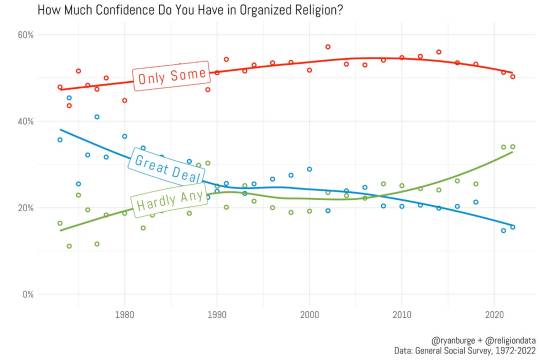
The most popular response option from the very beginning has been the middle one - only some trust in organized religion. It was about 48% of the sample in 1972, but that share has slowly crept up in the intervening decades. In the late 2000s, it was at an all-time high of 55%. But it’s receded just a bit from there and it currently sits right around 50%.
However, the share of folks who said that they had a great deal of trust in organized religion has really taken a dive. Between 1972 and 1990, that share dropped from about 38% to just about 25%. It stayed at that level for about fifteen years, then began to slide again. In the most recent data, about 15% of folks expressed a great deal of confidence in religion, while the share who had hardly any trust has risen from 15% in 1972 to 35% today. It’s fair to say that the average American is significantly more skeptical of religion today than a person from fifty years ago.
But what’s driving that change? Is it the fact that people are just growing more skeptical as they age or is it really generational replacement where older, more trusting people are dying off and are being replaced by young adults that are much more cynical?
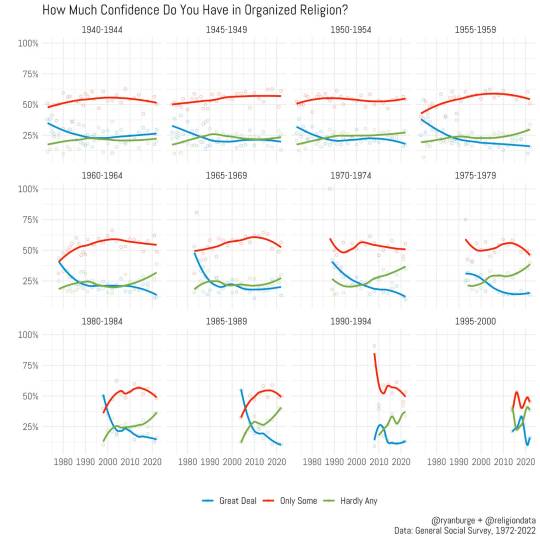
If you look at the top row of birth cohorts, you can see a pretty clear pattern in the blue line (that’s folks saying that they have a great deal of trust in religion). Among people born in the 1940s and 1950s, trust dropped clearly between 1972 and about 1990 and it edged down very slowly from that point. But you can also see some of that same pattern in people born in the 1960s, too.
For those born in 1970 or later, the pattern of a quick drop then a long plateau is just not as clear. Instead, it’s just a continued decline as these cohorts age. That’s really clear for folks born between 1970 and 1974 - the share with a great deal of trust has dropped by half as they have aged. From this angle it looks like both theories are true - each cohort became less trusting as they aged but also younger cohorts were less trusting than older ones. In other words, trust in religion has eroded across all age groups.
But maybe there’s a really simple reason for this - older people tend to be more religious and younger people are more likely to identify as religiously unaffiliated. It logically follows that non-religious folks would have less trust in religion. So, let’s see if trust in organized religion has declined even among Christians.

Well, this is a pretty striking graph. Trust in religion has dropped even for many religious people! For instance, about 40% of evangelicals had a great deal of trust in 1972, that’s dropped by nearly half over the last fifty years. You can also see that with mainline Protestants, Black Protestants, and Catholics, too. There’s a striking reality when looking at Catholics in the sample, they are the only group that currently is more likely to say that they have “hardly any” trust in organized religion than to say that they have a “great “deal” of trust.
But what about the non-religious? You can see that trust in religion has never been that robust. In the early years of the survey, nearly half of the nones said that they had at “only some” trust in organized religion. By the early 1980s, the most popular response option was undoubtedly “hardly any” trust. What I wanted to point out is the fact that this line has continued to rise over time. In fact there’s been very little deviation in the trend lines over the last 20 years or so.
Below is the share of each religious tradition that said that they had “a great deal of trust” in organized religion in the most recent data collected in 2022. It makes plain how trust in organized religion is incredibly low.

The group that clearly stands out here is Black Protestants - with nearly four in ten saying they had a lot of faith in religion. They are really an outlier here. Among evangelicals, mainline Protestants, and Catholics, the share who have a lot of trust in organized religion is less than 20%. About 80% of evangelicals are part of an organized religious group that they don’t trust very much. It’s quite overwhelming to think about, really.
When I was creating these graphs, I had a question lingering in the back of my mind - are Americans especially distrustful of religion or is it the case that religion is being caught up in the larger way of distrust that is sweeping over the United States in the last five decades?
The GSS has been asking about confidence in a bunch of institutions for decades (unions, the media, banks, the Supreme Court). So I calculated the share of the sample who reported a great deal of confidence in those other institutions and created an average trust score. Then I did the same for the question about organized religion. This is the end result of that calculation.

I think I can probably divide this graph up into three fairly distinct eras of institutional trust.
Era 1: Between 1972 and the mid-1980s, I think it’s fair to say that people seemed to trust religion slightly more than they trusted other American institutions. The gap isn’t huge here - probably averaging between three and five percentage points. But I think it’s fair to say that religion had a slight edge.
Era 2: Between the mid-1980s and the mid-2000s, the lines basically ran in parallel. It’s evident from this angle that religion was not trusted more or less than other institutions like labor unions or the media. The public didn’t really seem to distinguish between the two.
Era 3: The mid-2000s to today. It appears that religion has fallen below the trend line for other institutions. In fact, there’s only one survey year between 2002 and 2022 where the point estimates overlap each other and that happened in 2006. It looks like religion is ranked about two to three points lower than the rest of the institutions in American society.
I think about this issue a lot. There’s no doubt in my mind that the average American is much more anti-institutional today than the average American from the 1970s. A growing chorus of people are convinced that the structures that built the United States like religion, science, the media, and the government are corrupt, abusive, and deserve little respect. I don’t know if this trend toward distrust will continue into the future. What I do know is a world without institutions is not something that the average American has ever really considered. The old saying, “you don’t know what you’ve got till it’s gone” seems pretty appropriate in this situation.
==
Religions aren't entitled to respect or trust. People have figured out that religions are no different than anything else, where respect and trust must be earned, not simply demanded.
And religons simply haven't earned it.
3 notes
·
View notes
Text
University of Alberta researchers retract COVID study, citing multiple errors - Published Sept 6, 2024
Incidence of pediatric long COVID higher than had been reported in JAMA Pediatrics
A University of Alberta study on long COVID in children has been retracted.
The study found a "strikingly low" incidence of long COVID among children ages eight to 13 who contracted COVID-19.
However, during a review of their results, the authors discovered a key figure was incorrect.
The researchers had focused on a group of 271 children who tested positive for COVID and for whom there was sufficient data to determine the presence of long COVID.
Of that group of kids, only one — or 0.4 per cent — met the World Health Organization's definition of the condition, according to the study.
Incidence of long COVID 'strikingly low' in children, Alberta researchers find But after review, the authors found the actual incidence of long COVID in children and teens in the study group, is 1.4 per cent — or four out of 286 rather than one out of 271.
The authors of the article, published in JAMA Pediatrics, requested a retraction because they identified "methodological (analytical) errors" in their original report.
Dr. Piush Mandhane, a professor with the department of pediatrics at the University of Alberta, wrote a retraction note on behalf of his co-authors.
In the note, Mandhane explained that the errors impacted the researchers' estimate of prevalence of long COVID in children and adolescents and the "reported associations between pre- and post-COVID-19 symptoms."
"We identified a coding error whereby children with missing symptoms data were coded as having no symptoms. This error resulted in two participants being misclassified as having symptom resolution when they should have been classified as having [long COVID]," Mandhane wrote in the retraction note.
After the original study was published, the authors classified another child as having long COVID.
Other errors included the exclusion of 15 participants who should have been included in the study, and counting participants who fell outside the sample's age range of eight to 13 years old.
"We identified participants with COVID-19 [cases] who were recruited between one and 7.49 years and 14.5 and 19 years of age," Mandhane wrote in the retraction note.
There were other coding errors.
"We apologize to the readers and editors of JAMA Pediatrics for these errors," Mandhane wrote in the note.
"In discussion with the editors, who shared their concerns about the analyses and data reported, we are requesting a retraction of our research letter. All the authors of our research letter are in agreement with this retraction," Mandhane wrote.
JAMA Pediatrics is part of the JAMA Network, a group of medical scientific journals owned and published by the American Medical Association.
JAMA Pediatrics claims its impact factor is 24.7, which makes it the highest ranking pediatrics journal in the world.
JAMA Network declined to provide comment for this story.
"We believe the retraction letter from Dr. Mandhane speaks for itself," a public information officer for JAMA said in an email.
Dr. Kieran Quinn, a clinician-scientist at the Sinai Health System in Toronto, said in an interview that "it's important to acknowledge that research is a very difficult and sometimes messy endeavour."
"I commend the authors on their thoroughness in identifying these errors in their analysis and in transparently fixing them," Quinn said.
"In this case, they felt, along with the editors of the journal, that the errors were sufficient and numerous enough that they should actually retract the article rather than just correct it and update the analysis, which isn't always the case.
"I think that's actually an acknowledgement that they are good researchers and they're doing this in an ethical and responsible approach."
#covid#pandemic#covid 19#mask up#wear a mask#coronavirus#sars cov 2#public health#still coviding#wear a respirator
6 notes
·
View notes